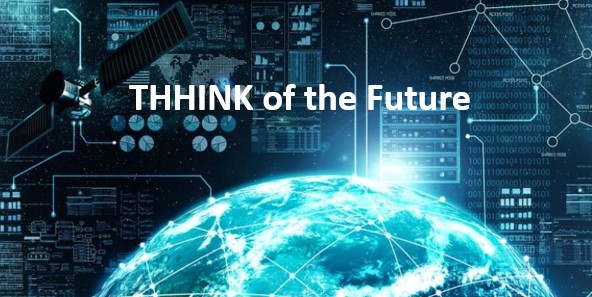


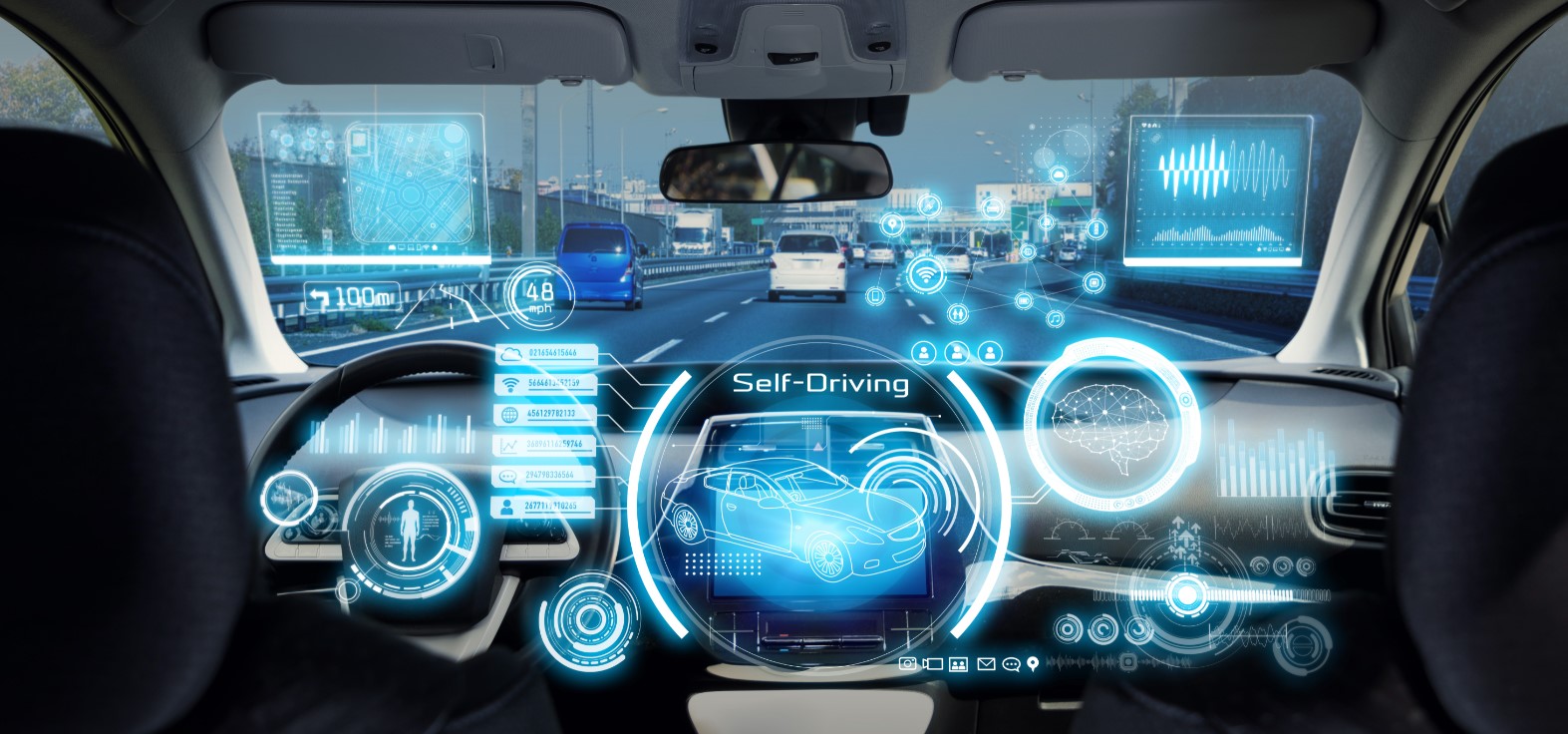
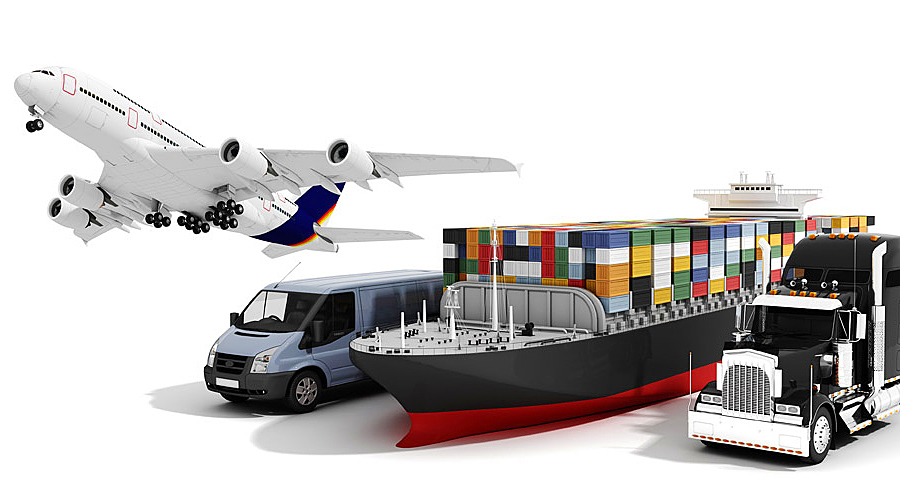
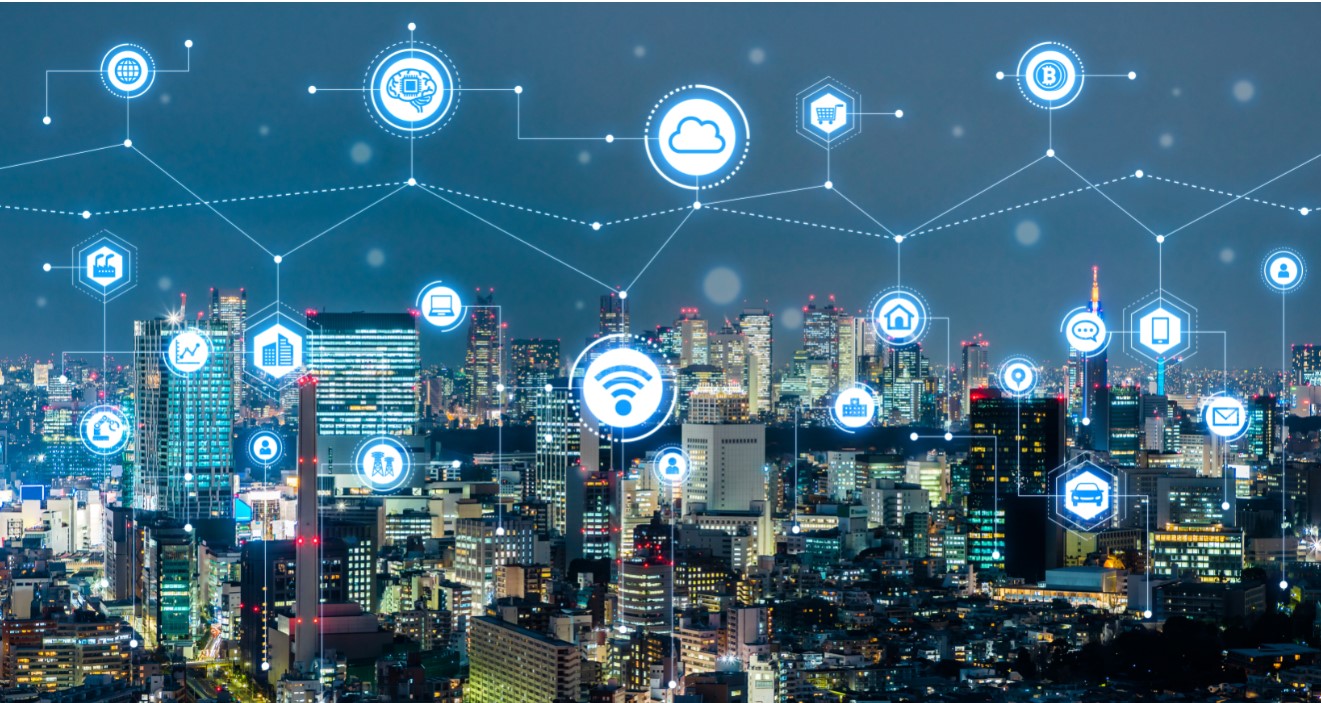
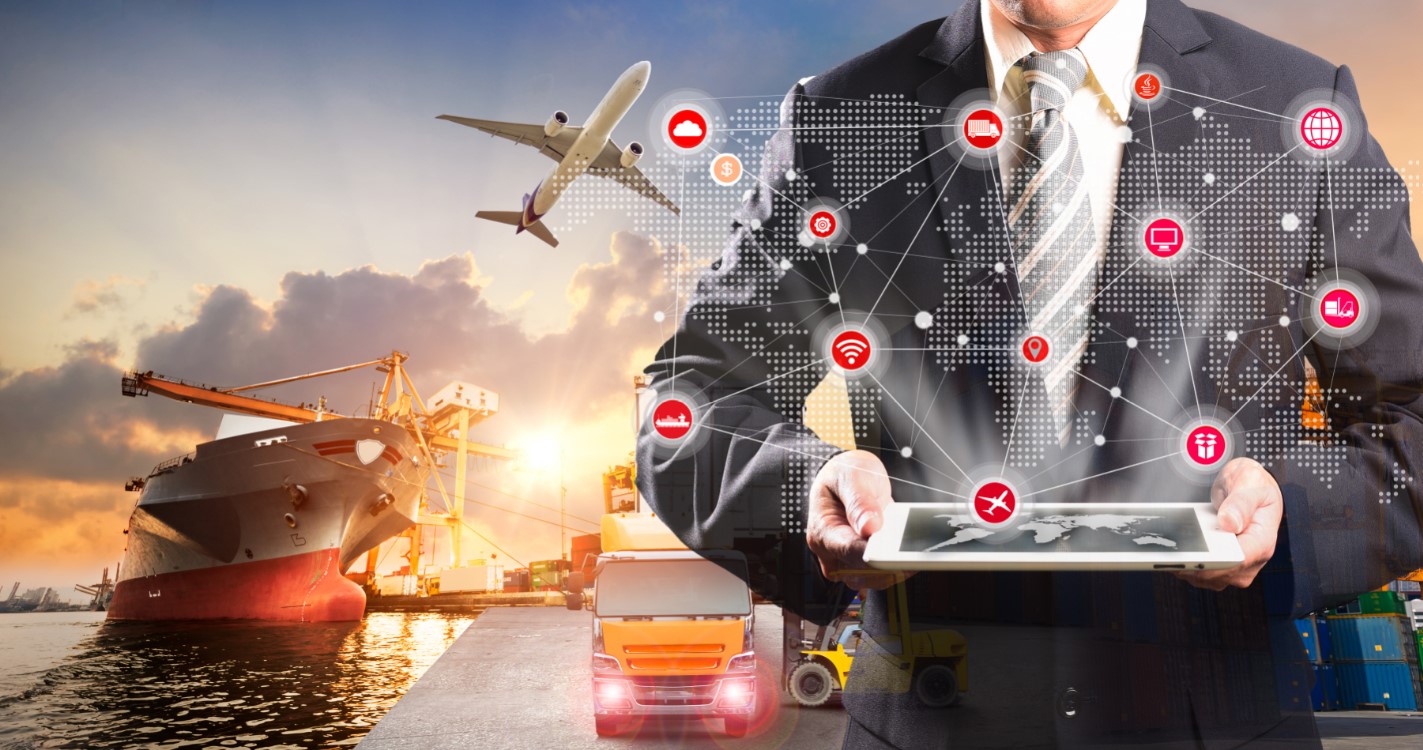
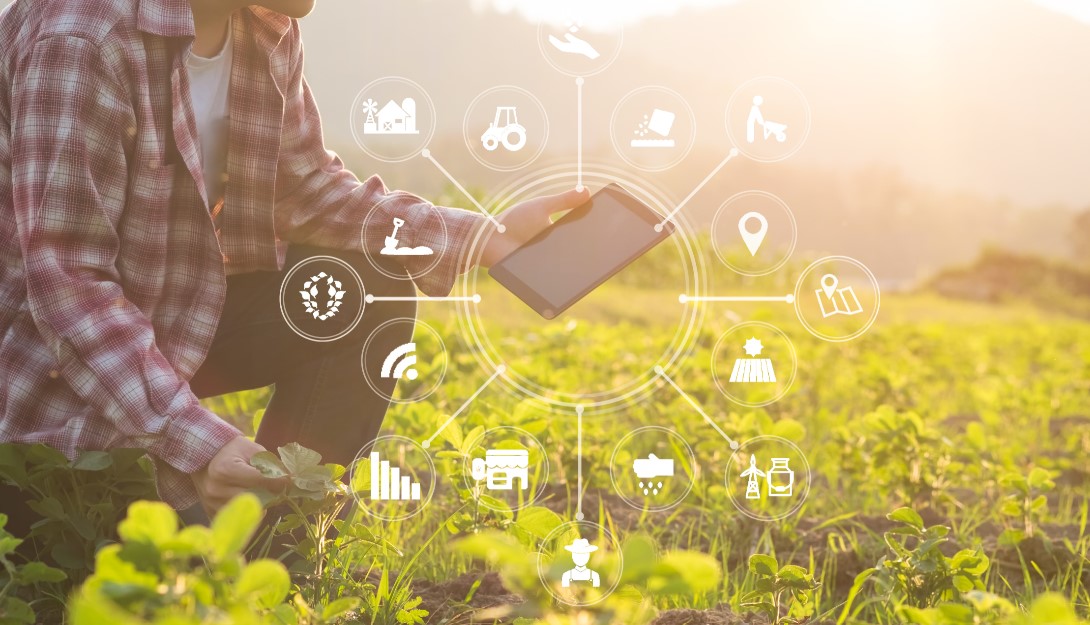
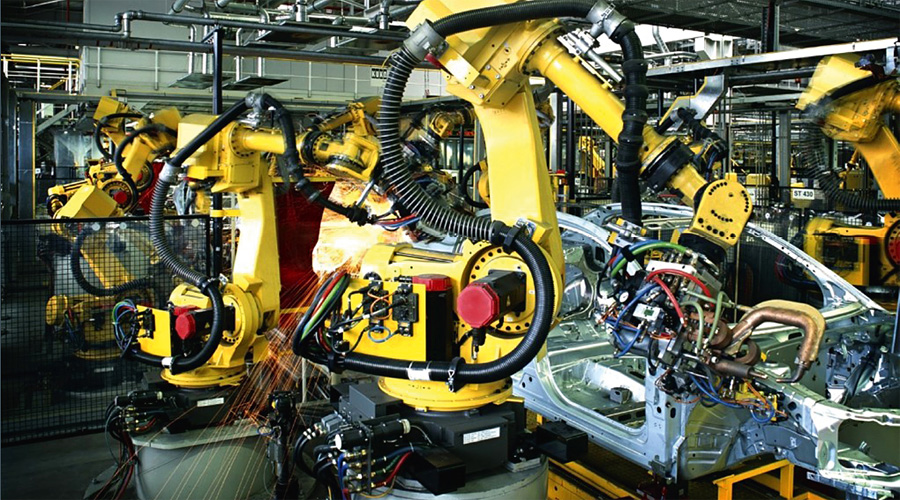

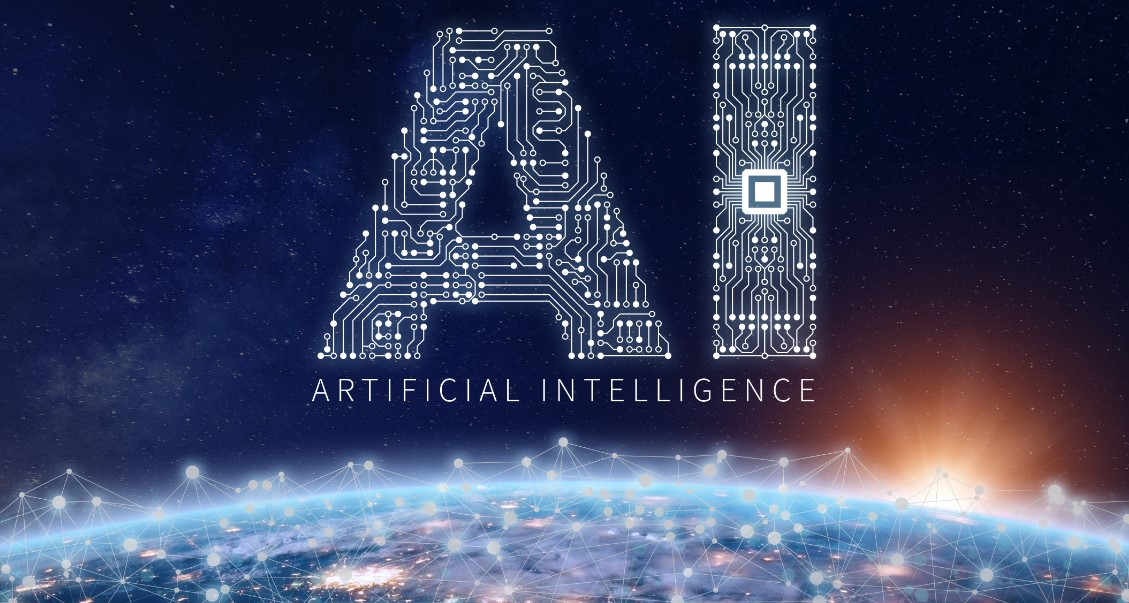
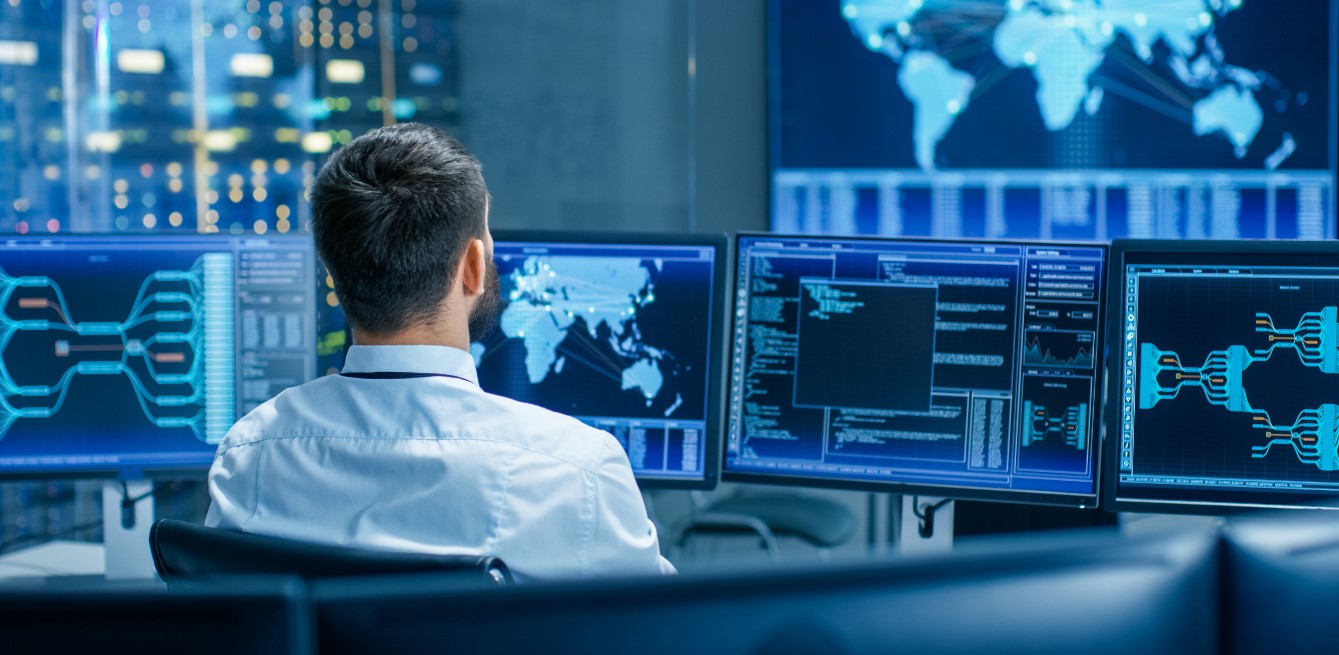
|
THHINK Wireless Technologies is a world-leading expert in custom platforms for diagnostics, health monitoring, telemetry, automation and control. The company has specialist expertise in advanced data analytics, robust, ultra low power embedded wireless sensors and energy harvesting. We develop innovative solutions for the aerospace, marine, automotive, rail, nuclear and agricultural sectors. We also perform cutting edge research and development for many leading companies to create innovative solutions. Working in partnership with industry, academia and the European Commission the company stays at the forefront of technology, driving innovation and looking to the future. Find out more about our expertise and how we can help your organisation. "Innovative solutions and technology expertise for the Aerospace, Automotive, Marine, Rail, Nuclear and Agriculture sectors." |

|
COMPANYTHHINK Wireless Technologies Ltd. was founded in 2009 after more than a decade of research and development in wireless and energy harvesting technologies, monitoring solutions and AI data analytics. The vision of THHINK is to create innovative technology solutions for ubiquitous sensing and computing to achieve a more efficient, interconnected and environmentally sound future. We are experts in the development of custom platforms for diagnostics, condition/health monitoring, telemetry and control with specialist expertise in robust, ultra-low power embedded wireless sensors and energy harvesting. We are leaders in the development of innovative new products for applications in the aerospace, marine, automotive, rail, nuclear and agricultural sectors. THHINK engineers have many years experience providing innovative research and products for Formula 1 Racing, Airbus, Rolls-Royce, NASA, and the MoD.THHINK provides Expert Advice to the European Commission on innovative electronics, Cyber-Physical Systems (CPS), Industrial Internet of Things (IIoT) and Artificial Intelligence (AI). The company is also on the UK’s Energy Harvesting Steering Group and Thermoelectric Industrial Advisory Group. Professional Services & Capabilities
Areas of Expertise

|
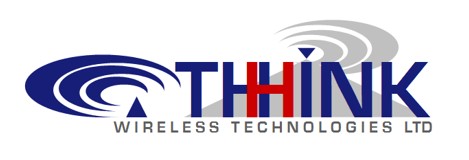
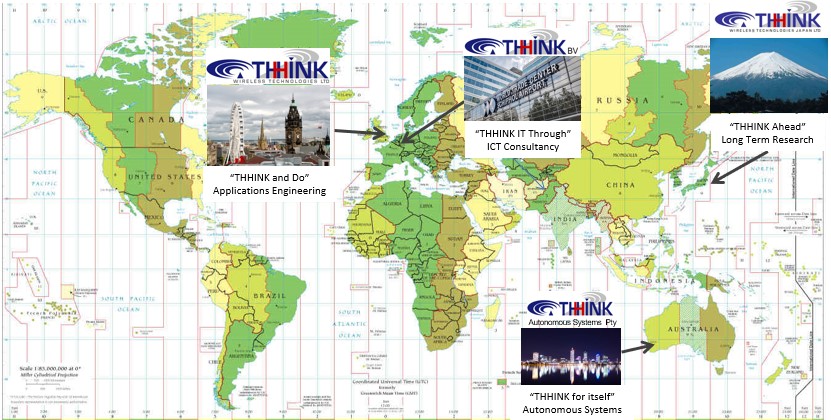
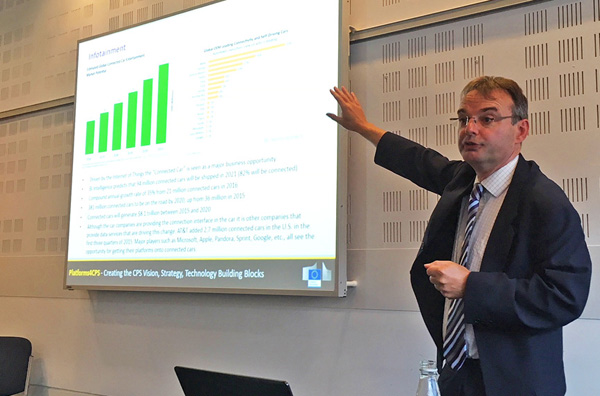
THHINK engineers have worked on a number of key programmes including: AEROSPACE | Tornado, Eurofighter, JAS-39, SAAB 2000, Apache Helicopter, Control Technology Programme, HiPECS, Lockheed Martin Joint Strike Fighter, Airbus A380, More Electric Aircraft, BROADEN, DAME, Active Flow Control, Boeing 777, Boeing Dreamliner and ASTRAEA MARINE | Ship automation systems, marine gas turbine engines, waterjet technologies, azimuth thrusters and the design of reactor control systems for nuclear submarines. Autonomous unmanned systems, long-endurance operations and persistent-presence maritime surveillance. Satellite and underwater communications and remote monitoring for metocean, environmental, maritime surveillance and offshore oil & gas applications ENERGY | Industrial gas turbine engines, wind turbines, solar technologies and nuclear power stations AUTOMOTIVE | Ford, Jaguar and Formula-1 racing technologies RAIL | Network Rail infrastructure monitoring and introduction of wind and solar energy harvesting technologies for powering stations SPACE | Columbus Programme |
EXECUTIVE TEAMHaydn Thompson BSc, PhD, CEng, FIET, MIEEE, MRAeS, MAIAAProfessor Haydn Thompson, BSc, PhD. CEng has over 35 years' experience working in a mixture of senior industrial research and development roles in flight control systems, space programmes and radar signal processing applications for leading companies. From 1993- Feb. 2013 he was the Programme Manager of the Rolls-Royce Control and Systems University Technology Centre. He is Managing Director and founder of the THHINK Group of companies. He is recognised and used by the European Commission as an expert in many fields, CPS, IIoT, AI, aerospace, automotive, autonomous vehicles, smart agriculture, advanced electronics, etc. and is a consultant to a range of companies and government bodies. He defines Strategic Technology Roadmaps across Europe and for companies such as Rolls-Royce.He has over 100 publications in the field of CPS and IoT applications, including on distributed systems, multi-disciplinary multi-objective optimisation, gas turbine engine control, fault diagnosis and health monitoring, wireless communications, energy harvesting, rapid prototyping and co-simulation. He has also written two books on gas turbine engine control. He is, or has been, a member of the International Federation of Automatic Controls (IFAC) International Aerospace Control, Mechatronics and Real-Time Computing and Control Committees being chair of Embedded Systems, the Institution of Electronic and Electrical Engineers Aerospace Committee, and IET representative on the Learned Society Board of the Royal Aeronautical Society. He is a member of the American Institute of Aeronautics and Astronautics. In addition to running many research programmes with Rolls-Royce working on key programmes, Professor Thompson was the co-ordinator for the European Union funded IST FLEXICON project, led work on the More Electric Aircraft in the Airbus/EU MOET project and led two consortia of 4 Universities in the WICAS and SWIFT projects with Airbus. He has also run successful research programmes with rail companies developing self-powered wireless sensor technologies for infrastructure monitoring. Recent EU projects include CPSoS (Cyber Physical Systems of Systems) where he chaired the Expert Group of Transport and Logistics covering Aerospace, Automotive, Rail, Maritime and Logistics, Road4FAME defining a Roadmap for Manufacturing Research within Europe, PICASSO which promoted Joint EU-US Collaborative Research and Platforms4CPS which defined a strategic roadmap for the future of Cyber-Physical Systems. Max Ong BEng.Hons, PhD, MIET, MIEEE, MAICD, PRINCE2Dr Max Ong received a BEng.Hons in Computer Systems Engineering at the University of Sheffield and a PhD in Automatic Control & Systems Engineering. During this time, he was awarded the Sir Harold West Award and Mappin Award by the University. Max is Technical Director and co-founder of THHINK and has a wealth of experience in a number of domains. Previously Max was joint team for SEAS-DTC Defence and Rolls-Royce UTC CSE who designed and simulated adaptive control systems for an advanced hybrid fuel-electric Unmanned Combat Aerial Vehicle (UCAV). Additionally, Max conducted extensive R&D on the £4.6M DTi / TSB BROADEN project and the £3.2M e-Science DAME project to develop knowledge-based diagnostic and prognostic monitoring systems that leveraged innovative Grid Computing. The work enabled Rolls-Royce to deliver advanced Equipment Health Monitoring (EHM) in the Aero and Marine business sectors by applying optimal pro-active maintenance strategies within a revolutionary TotalCare programme for Rolls-Royce. Following this, he took on the role of Systems Architect within Rolls-Royce's EPACS aero engineering group.Dr Max Ong was Chief Technology Officer of FASTWAVE Communications specialising in Autonomous Unmanned Systems, satellite telemetry and underwater sensing/communications for remote monitoring applications across metocean, environmental, maritime surveillance and offshore Oil & Gas industries. As CTO and drone pilot at Fastwave, Max headed the autonomous robotics and unmanned sensors division including operation of KONGSBERG Maritime's 'Seaglider' AUV and eletronic data systems integration across LIQUID ROBOTICS 'Wave Glider' marine robotic vehicles capable of long-endurance missions and persistent-presence maritime surveillance. Max is a certified PRINCE2 Project Management Professional and member of the IEEE and IET engineering institutions, AAUS Unmanned Systems and Australian Defence RPDE. He is highly experienced in the design and integration of bespoke hardware and software systems for Autonomous and Unmanned vehicles, wireless communications, control systems, distributed systems and strategic decision support. Daniela Ramos-Hernandez BEng, PhD, CEng, MIET, MIEEEDr Daniela Ramos-Hernandez, CEng, has 25 years' experience in a variety of research and development projects. Originally an IBM trained computing engineer working for major banks she decided to pursue a career in research and development gaining a PhD in 1999 in heterogeneous parallel processing. Following this she worked on industrial research projects in ICT with BICC in process control integration for manufacturing and was Technical Coordinator of the EU funded FLEXICON project managing 5 partners across Europe. In this project control and wireless monitoring systems were developed with Rolls-Royce Marine for future fast ships.She later joined the Strategic Research Centre of Rolls-Royce Aerospace working within the Information Engineering Team as a Staff Technologist investigating and implementing new Intelligent Techniques based on AI for Engine Health Monitoring. During this time she worked on the DTi funded projects such as BROADEN and HECToR and was the Programme Manager for Engine Health Monitoring of Unmanned Air Vehicles on the ASTRAEA DTI project, as well as the Programme Manager of a Safety and Reliability project. Following this she became a Systems Engineer at Aero Engine Controls Ltd. a joint venture between Rolls-Royce and Goodrich Aerospace. Daniela has a wealth of experience in condition monitoring and digital signal processing and is a consultant to the European Union in the areas of ICT and Smart Grid. |
NEWSEFECS 2019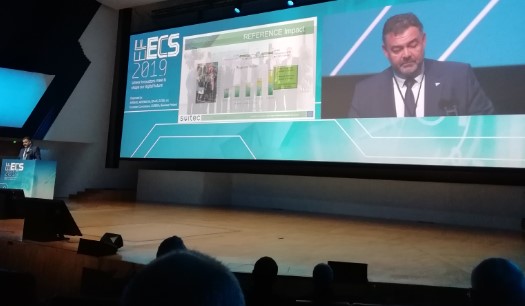
Haydn Thompson attended a number of meetings at the European Forum for Electronic Components and Systems (EFECS) which was held on the 19-21 November 2019 in Helsinki, Finland. EFECS is the international forum with a focus on “Our Digital Future” along the Electronic Components and Systems value chain in Europe. The event was organised by AENEAS, ARTEMIS-IA, EPoSS, ECSEL Joint Undertaking and the European Commission, in association with EUREKA, who have joined forces to bring all stakeholders together. EFECS brings together key stakeholders to learn more about the latest developments, co-operation and funding possibilities in the ECS Community. Digitising European Industry Stakeholder Forum 2019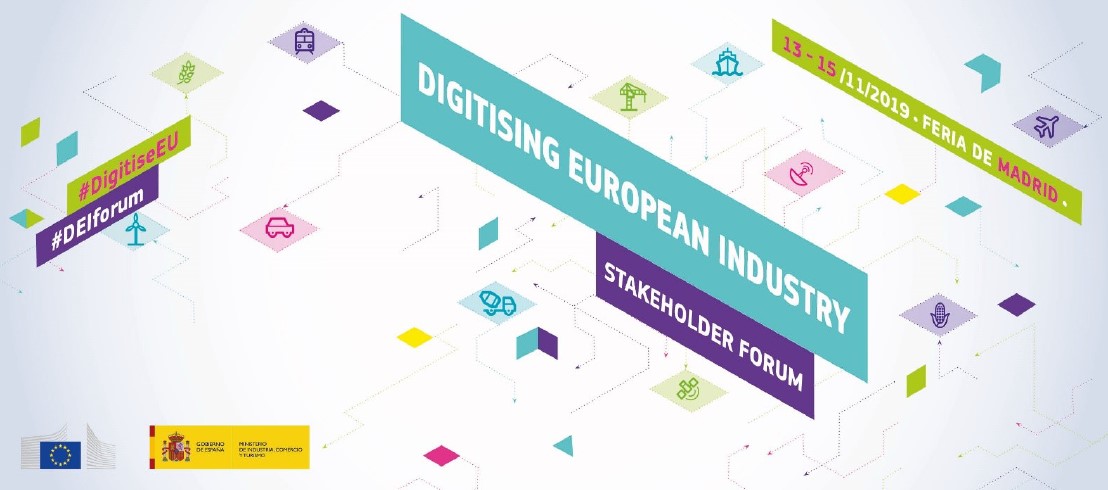
Haydn Thompson attended the Digitising European Industry Stakeholder Forum which took place in Madrid from the 13th to the 15th of November 2019. The Stakeholder Forum is a public event organised on a yearly basis by the European Commission and one Member State within the context of the Digitising European Industry initiative (DEI). In coordination with the Spanish Ministry of Industry, Trade and Tourism this year's event focused on “Artificial Intelligence and Digital Innovation Hubs - beyond 2020". The event provided an opportunity for different actors involved in the digital value chain to share experiences, exchange best practices and discuss the future of EU digital industrial policy. Among them were representatives from Member States and regions, national initiatives for digitalisation, industry, SMEs, academia, Digital Innovation Hubs and research and technology centres. ICT Proposers’ Day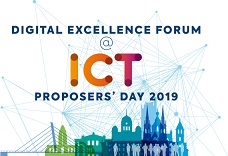
Haydn Thompson was invited by the European Commission to speak on AI in Manufacturing at the ICT Proposers’ Day which was held in Helsinki, Finland. The event focused on the upcoming calls of the Horizon 2020 work programme in the field of Information & Communication Technologies, Future and Emerging Technologies (FET), and Societal Challenges. The event offered an exceptional opportunity to build quality partnerships with academics, researchers, industrial stakeholders, SMEs and government actors from all over Europe. 7th DIH Working Group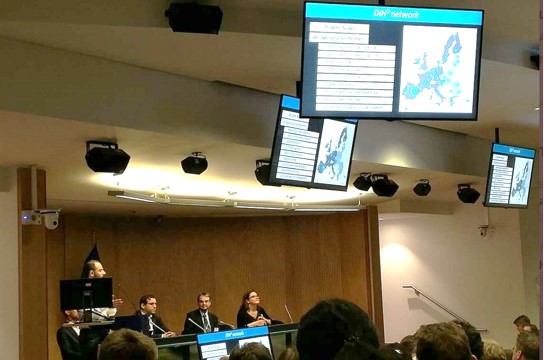
The seventh meeting of the Working Group on Digital Innovation Hubs held in Brussels on the 1st July 2019. Haydn Thompson was invited to give a “provocative” presentation on the needs of SMEs and how the DIH programme needs to change to meet these. The event was dedicated to discussing elements of the implementation of Digital Europe (DEP) with regard to Digital Innovation Hubs (DIHs), seeking feedback from stakeholders on these and exploring the challenges and possible solutions for building a strong pan-European DIH network, in particular by connecting them to regional and national policies. European Industry Partnerships Collaborative Event
Haydn Thompson was invited to speak at the European Industry Partnerships Collaborative Event which was held on the 17 April 2019 at the Steigenberger Airport Hotel in Amsterdam. The aim of the event was to develop and enlarge the European IoT ecosystem through collaboration and coordination among various European Partnerships. This requires the development of strong links between communities of IoT users and providers, to discuss, align and plan research and innovation agendas for development and deployment of IoT technologies and applications across various industrial sectors as part of the next Framework Programme for research and Innovation. 
The event brought together representatives of a large number of key initiatives across Europe as well as the European Commission. ARTEMIS Technology Conference 2019
Haydn Thompson attended the 2nd ARTEMIS Technology Conference on the 16th April 2019 in Amsterdam. The ARTEMIS Industry Association represents leading European Companies and Haydn Thompson was very honoured to give the Keynote at the 1st ARTEMIS Technology Conference. Above Haydn is seen with Martin Torngren from KTH who gave the Keynote at this year’s event. THHINK is proud to now be a partner in the KTH led TECoSA programme. This year’s event addressed the challenges that will need to be solved in coming years to unlock the full potential of digital transformation in areas such as embedded intelligent systems and smart cars. ICT 2018 Vienna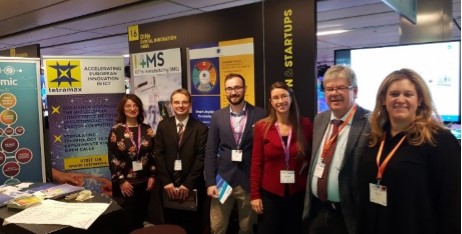
ICT 2018 took place in Vienna on 4-6 December 2018. THHINK was represented on 2 stands at the event. This research and innovation event attracted 4800 visitors and focused on the European Union’s priorities in the digital transformation of society and industry. It presented an opportunity for the people involved in this transformation to share their experience and vision of Europe in the digital age. The conference programme featured influential speakers and debates around the EU’s digital policy. Final Consultation Event – CPS Innovations for the Future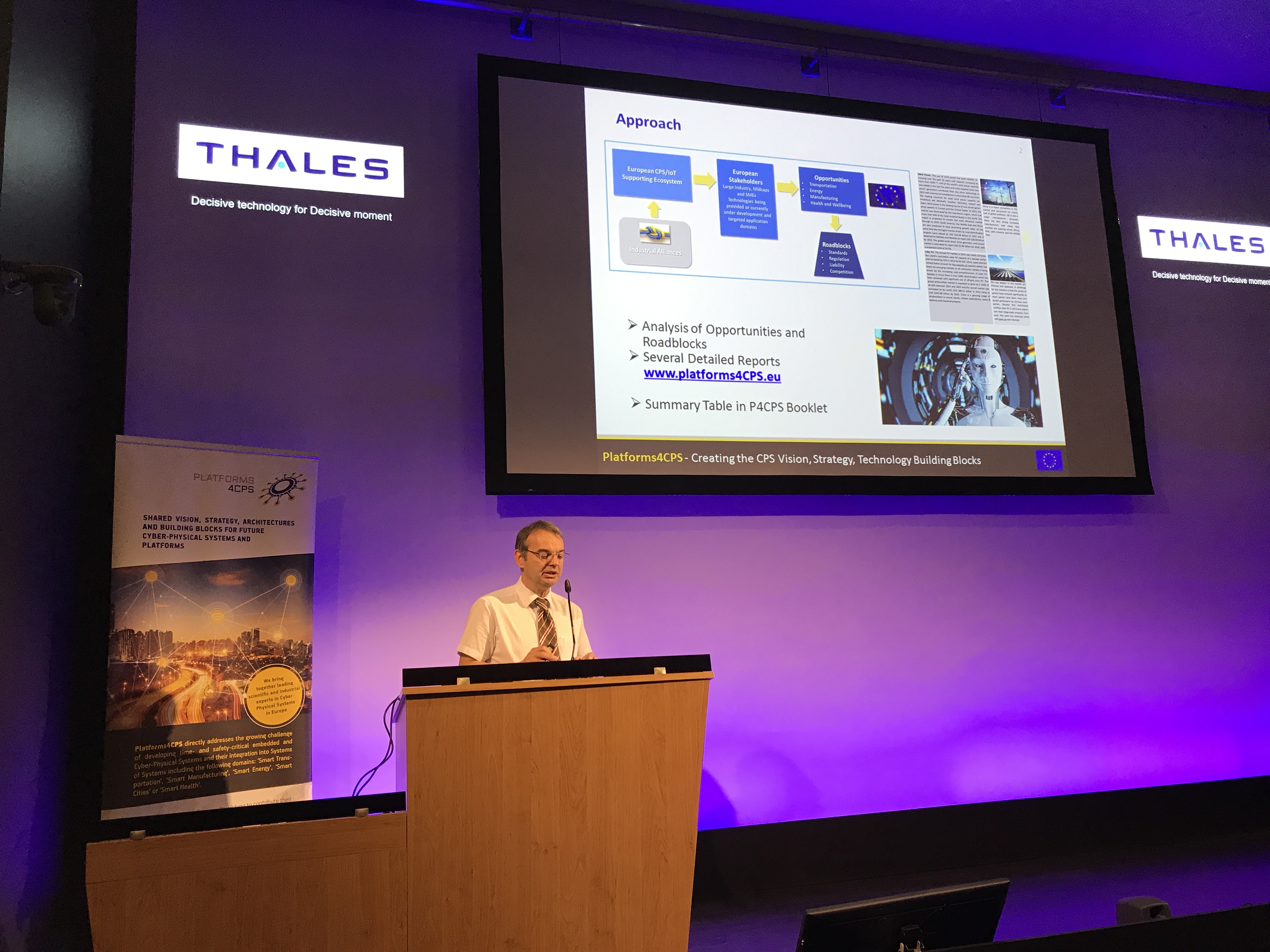
The Platforms4CPS Final Consultation Event was held at THALES TRT, Palaiseau, near Paris on 12th September 2018. This major event presented the work that had been performed in the Platforms4CPS project and also the recommendations that have been put forward for research, innovation, societal and legal issues and business that will shape the development of CPS in the years to come. Invited speakers from the CPS community and from the associated CPS cluster also gave presentations on key topics of relevance such as AI and IoT. Examples of CPS technology integration were also presented. Stakeholder Forum 2018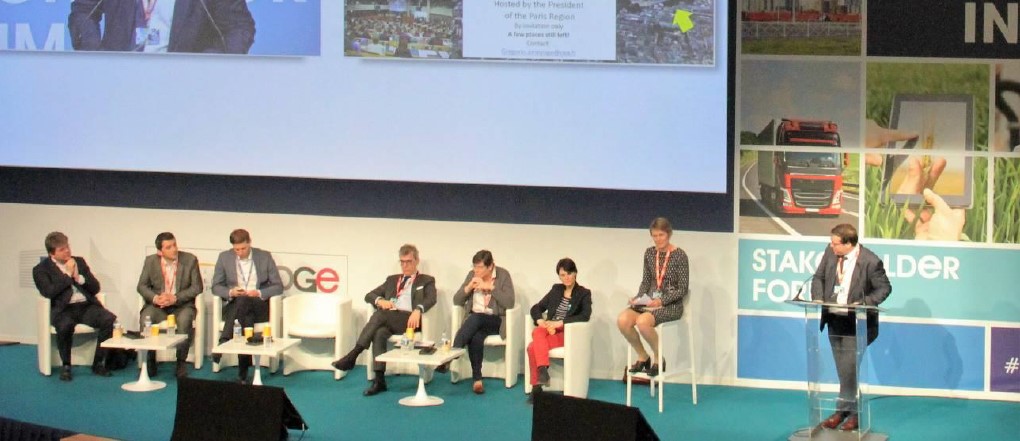
The European Commission asked Haydn Thompson to be the Rapporteur for the Stakeholder Forum held on 27th-28th March 2018 in Paris, France. This event supported by the European Commission with the patronage of Emmanuel Macron brought together high-level representatives from National and European initiatives as well as business leaders from around Europe with the aim of understanding best practice and approaches to Digitising European Industry. The event highlighted the benefits of improved collaboration and engagement with stakeholders across the digital value chain. Participants shared experience and considered how progress towards digitisation could be accelerated. There was a focus on take-up and diffusion of digital innovations to businesses and industry leaders discussed ideas and best practices on how to make companies, notably SMEs, aware of the importance and potential of digital technology. This considered the organisational, technological and financial factors that are needed to support SMEs and large companies in their digital transformation projects, as well as aspects related to the integration of the value chain and its effects on competitiveness. Haydn Thompson was invited to sum up the event in the closing session and produced a report on the event. HiPEAC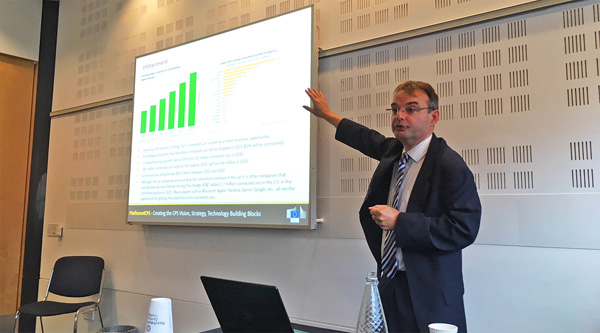
Haydn Thompson presented on Market Opportunities for CPS in Transportation at a workshop on CPS Success Stories Workshop" organized in Manchester during the HiPEAC 2018 event. The HiPEAC conference is the premier European forum for experts in computer architecture, programming models, compilers and operating systems for embedded and general-purpose systems. EFECS
Haydn Thompson of THHINK attended the European Forum for Electronic Components and Systems (EFECS) in Brussels in December 2017. This is an international forum with a focus on 'Our Digital Future' along the Electronic Components and Systems value chain in Europe. The organisers of this event, AENEAS, ARTEMIS-IA, EPoSS, ECSEL Joint Undertaking and the European Commission joined forces to bring all stakeholders together. The event featured strategic sessions around the ECS-SRA (Strategic Research Agenda for Electronic Components and Systems) which THHINK contributed to. There was also a large exhibition of R&I results and new project ideas. THHINK was represented at both the Smart4Europe and Platforms4CPS stands. Also during the event THHINK collected input via a questionnaire on new technologies for the Smart4Europe Technology Radar. The event was particularly useful in bringing together participants from a number of different project clusters allowing many interesting interactions and discussions on new technologies. Also during the event Haydn Thompson had a meeting with the European Investment Bank as part of work on mapping funding sources across Europe. Digital Innovation Forum - DIF EventTHHINK attended the DIF Event held at RAI Amsterdam on 10th and 11th May. This international event is the industry-driven Digital innovation conference in Europe, showing R&I results and emerging challenges towards a vision of the future for and built by industry.The event was co-organised by the ARTEMIS Industry Association and the EUREKA Cluster ITEA. During the event Haydn Thompson and Nick Askew participated in the PLATFORMS4CPS Market Landscape Workshop identifying future market segments for new technologies. 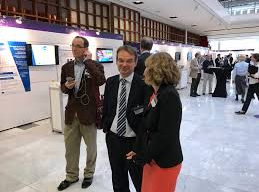
Cyber-physical Systems of Systems - The Next ChallengeThe CPSoS project organised the workshop "Cyber-physical Systems of Systems - The Next Challenge" at Hannover Messe on 2016 on April 26th. The aim of the workshop was to discuss the way forward for the engineering and management of large-scale cyber-physical systems of systems and also to present the results of the CPSoS project summarised in the recently published document "Proposal of a European Research and Innovation Agenda on Cyber-physical Systems of Systems - 2016-2025".Discussions were stimulated by presentations from leading representatives of the European industry that develop and deploy components of cyber-physical systems of systems, who presented their views on the state of the art and future of the cyber-physical systems of systems. Haydn Thompson gave a presentation on "Cyber-physical Systems of Systems Challenges in Manufacturing". The workshop attracted around 40 participants from around the world (Europe, Japan, New Zealand and the USA).
Hannover Messe
The objective of the conference was to present the package and discuss with ministers and industrial leaders the challenges of digital transformation of industry in Europe and the added value that the envisaged action can bring in this process. The focus was on partnerships, innovation hubs and standardisation to boost Europe's digital innovation capacities. Penny Pritzker, US Secretary of Commerce: Digital transformation of industry presented the US perspective on transatlantic collaboration issues in the context of the digital transformation. Several panels of industrial leaders discussed the challenges of digital transformation of industry in Europe and how this EU initiative can help speed up this process. Workshop on Smart Cities at The Beacon Council
e-MERGE Americas
The event brings together start-ups and investors. The eGOV event also brings together government officials, urban planners, and others from North America, Latin America and Europe with a shared goal to transform their urban communities into smart cities through the power of innovative technology. The Government Innovation Summit provides an ideal platform for public-private partnerships.
"Accelerating Smart Cities": environment, safety, transport, utilities & buildings at Gray Robinson Attorneys at Law
The attendees included CEOs from high tech companies, European Consuls General and Deputy Consuls General (Canada, France, Germany, Italy, Spain, UK, Monaco, Tobago & Trinidad...), Miami Dade County Economic Development and International Trade, Executive Directors of European Chambers of Commerce (France, Germany, Italy) Miami City Hall Representatives, and the Science & Innovation counsellor, Head of Office Embassy of Sweden. Smart Cyber-Physical Systems Clustering and Communication Event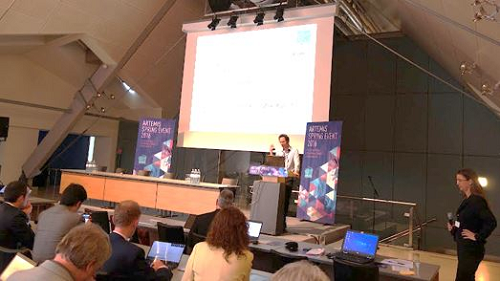
The Clustering and Communication Event was organised by the Road2CPS and ARTEMIS Industry Association. The event brought together 120 experts from the fields of Cyber-Physical Systems (CPS) and the Internet of Things (IoT) and presented 19 projects that had been funded under the first call of Horizon2020, ARTEMIS and ECSEL. Each project presented their aims and key outcomes. This raised awareness of activities going on within the various projects and also provided an overview of the coverage of the research activities across the domain. The timing of the meeting was also very pertinent with the launch of the new ARTEMIS-IA Strategic Research Agenda and also the Digitising European Industry initiative with many synergies being apparent. Haydn Thompson of THHINK was the Rapporteur for the event and chaired a Synergy Session. The meeting highlighted a number of areas where there were opportunities for collaboration and also promoted fruitful discussions between projects both in the meeting and post meeting. CPS Week Vienna - CPSoS: Cyber-Physical Systems of Systems
Haydn Thompson of THHINK presented at the CPSoS dissemination event held at CPS Week in the Hofburg Palace in Vienna. The Support Action 'CPSoS - Towards a European Roadmap on Research and Innovation in Engineering and Management of Cyber-Physical Systems of Systems' has been funded by the EU to establish the state-of-the-art and future research challenges in the area of Cyber Physical Systems of Systems. Cyber-physical systems of systems (CPSoS) are large complex physical systems that interact with and are controlled by a considerable number of distributed and networked computing elements and human users. Examples are rail systems, electric grids, smart buildings, and large production facilities. These systems are of crucial importance for the well-being of the citizens, mobility and the prosperity of Europe. Via means of three industry/academia Working Groups and consultations and interviews with over 100 practitioner experts in the field from large companies, mid-caps, SMEs and academics, the project produced a comprehensive view of the state-of-the-art in transport and logistics, electric grids, smart buildings, industrial production systems and in supporting tools and techniques. Haydn Thompson Chaired the Working Group on Transport and Logistics covering the automotive, aerospace, rail, maritime and logistics sectors. The program for the event consisted of presentations from both industry and academia that underpinned the importance of the key research topics identified in CPSoS. |
|
At the Forefront of Technologies
THHINK is proud of its cutting edge heritage and continues to innovate and research into the latest technologies. It is only through this continuous effort that new world-beating products and solutions can be developed. THHINK thus invests considerable time and resources into assessing and demonstrating new technologies. THHINK strives to be at the forefront of AI, IIoT and Edge computing performing in-house research and also championing joint activities via universities, company collaborations, national and European funded activities. AI
The term Artificial Intelligence or AI was originally coined as a term in 1956. The original focus on AI was in Expert Systems, however, we are now on the 3rd wave of AI and this is having a great impact in many areas. AI has thus become an important topic and there is an international race with different regions investing heavily: North America is investing $15bn-23bn, Europe is investing $3bn-4bn and Asia is investing $8bn-12bn. 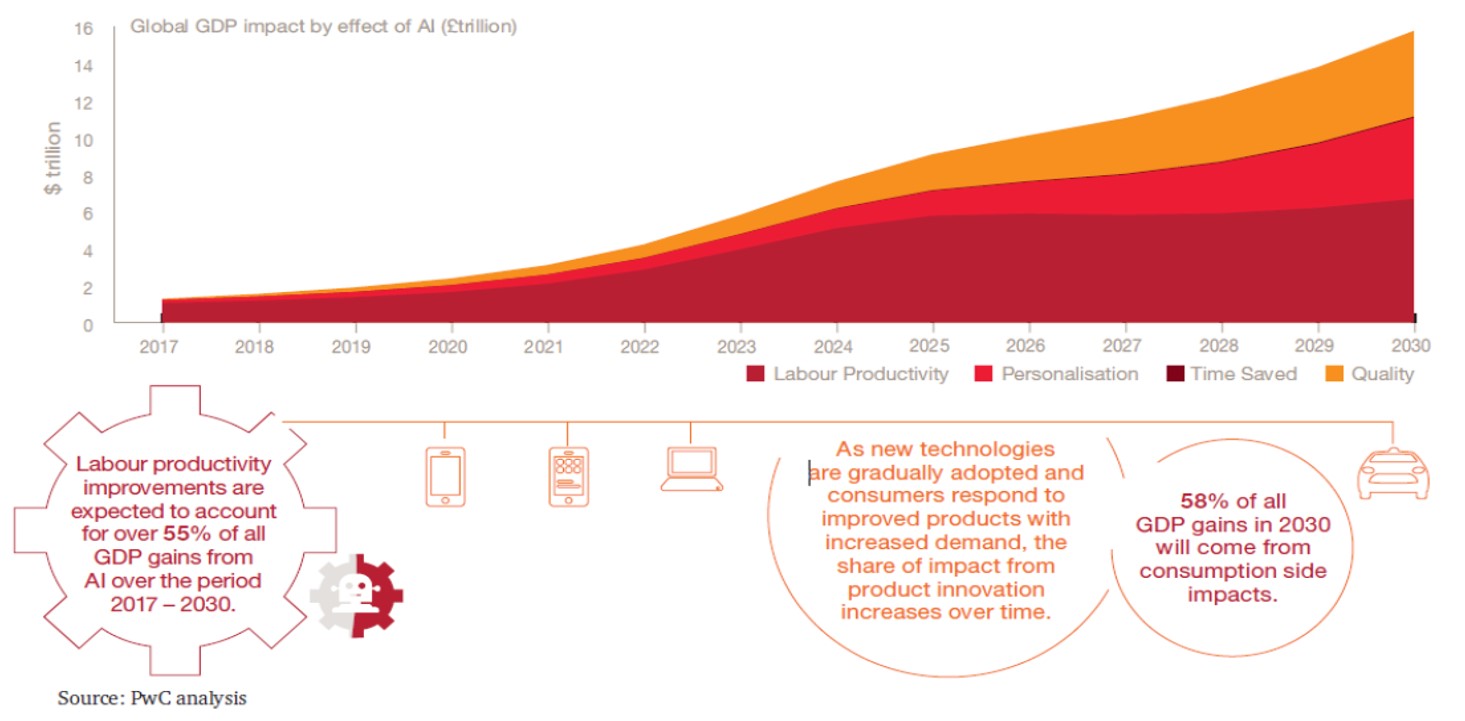
[Source PwC, “Sizing the prize, what’s the real value of AI for your business and how can you capitalise?, 2017”] A PwC paper has identified the potential value from exploitation of AI as being $15.8 trillion. This is supported by studies by McKinsey, Microsoft and Accenture. A study from Gartner also identifies that AI implementations grew 37% during 2018 and 270% in the last 5 years. Exploitation of robotics is expected to bring half the impact of AI through use of cognitive mechatronics, social human robot interaction, model-based design and configuration. Adoption of AI will radically change organisations introducing new business models and working methods. THHINK engineers have been working on AI for over 20 years and there is a wealth of experience gained from many applications addressing core challenges such as availability of data, trustworthy AI and interaction with humans considering safety and privacy. There are new emerging applications in predictive maintenance, cost reduction, automated testing, image processing, improved quality of products, personalisation of products, emotion detection and supply chain management. The company continues to innovate in the area performing in-house development of AI technologies and also by supporting research in Universities such as Cranfield University looking at the application of AI for UAVs and in image processing for Shark Detection and Plastic Pollution monitoring. Industrial Internet of Things (IIoT)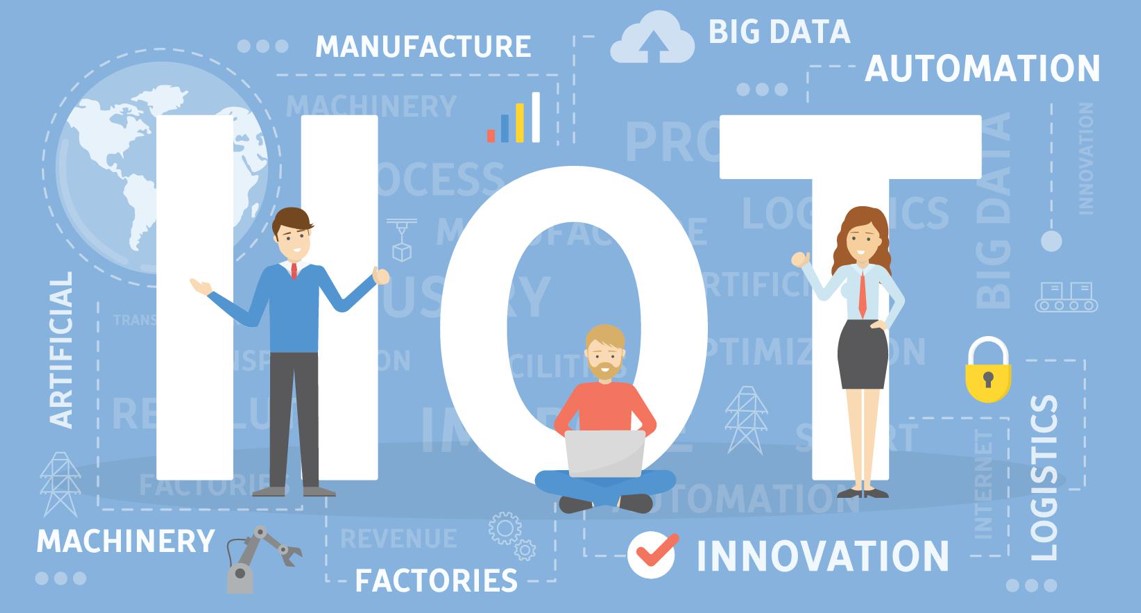
THHINK is active in driving the future of the Industrial Internet of Things. IIoT is a term that describes interconnected sensors, instruments, and other devices that are networked together with computers in industrial applications. This allows data collection, exchange, and analysis, potentially facilitating improvements in productivity and efficiency as well as other economic benefits. IIoT is a development of decentralised control systems that allows for a higher degree of automation by using cloud computing to refine and optimize process control, typically in manufacturing and energy management. It is closely related to the field of Cyber Physical Systems which are more closely connected to physical machines. IIoT is enabled by technologies such as cybersecurity, cloud computing, edge computing, mobile technologies, machine-to-machine, 3D printing, advanced robotics, big data, Internet of Things, RFID technology, cognitive computing and Artificial Intelligence. Edge ComputingTHHINK is very much at the forefront of Edge computing. Edge computing is a distributed computing model in which computing takes place near the physical location where data is being collected and analysed, rather than on a centralised server or in the cloud. Although THHINK can provide connectivity to the THHINK Cloud there are also sometimes advantages to processing data locally and here the company has produced a range of solutions. Sensors collect data and local processing + storage can be used to provide rapid response times which are particularly needed for autonomous systems, to reduce the amount of data transmitted (e.g. to provide alerts if vibration limits are exceeded rather than raw vibration data) or to provide privacy and security by keeping sensitive data on-site at the “edge”.It is estimated by IDC that by 2025, 175 zettabytes (or 175 trillion gigabytes) of data will be generated around the globe. Edge devices will create more than 90 zettabytes of that data. [IDC Data Age 2025 report The Digitization of the World: From Edge to Core] Edge computing is thus becoming more important as it creates new and improved ways for industrial and enterprise-level businesses to maximise operational efficiency, improve performance and safety, automate core business processes, and ensure “always on” availability. Key features of edge-based systems are that they provide low response times, relieve network capacity and enhance privacy. Due to these technical advantages, edge computing systems have a tremendous application potential with a projected global market in the order of tens of billions of dollars by 2022. TECoSA - Center for Trustworthy Edge Computing Systems and ApplicationsTHHINK are very pleased to be a core founder partner of TECoSA www.tecosa.center.kth.se which is a new joint Industry and Swedish Government funded Vinnova research centre which started on March 26, 2020. The centre brings together KTH and 13 industrial partners including THHINK. The aim is to provide methods, tools and theory for building safe, secure and predictable systems relying on edge computing.The centre will address connected smart devices and sensors, edge-based systems with fast response times avoiding the latency and bandwidth issues related to centralized cloud-based solutions, and contribute to enhanced privacy with the aim of making edge-based cyber-physical systems (CPS) safe, secure and predictable. There are three different application types enabled by edge computing: (1) Interactive human-in-the-loop applications; (2) Data driven real-time analytics; and (3) Automated and collaborative Cyber-Physical Systems (CPS). |
Tech Brief: General Data Protection RegulationTHHINKOn 25th May 2018 all companies that collect data on citizens across the 28 EU member states had to comply with strict new rules protecting customer data with the introduction of the General Data Protection Regulation. The regulation dictates that it will not be allowed by law to collect data on:
So what does this mean for companies? The GDPR requirements forces companies to change the way they process, store, and protect customers' personal data. For example, companies are allowed to store and process personal data only when the individual consents and for "no longer than is necessary for the purposes for which the personal data are processed." Personal data must also be portable from one company to another, and companies must erase personal data upon request enshrining the concept of the "right to be forgotten". So the good news is that we now get a bit more privacy - the question is how many companies meet the new regulation? Any company that stores or processes personal information about EU citizens within EU states must comply with the GDPR if they have:
The GDPR defines three key company roles that are responsible for ensuring compliance: data controller, data processor and the data protection officer (DPO). The data controller defines how personal data is processed and the purposes for which it is processed. The controller is also responsible for making sure that outside contractors comply. Data processors may be the internal staff that maintain and process personal data records or any outsourcing firm that performs all or part of these activities. Notably it is the data processors who are liable for breaches or non-compliance. Thus if your cloud provider is fined you may well be fined as well so choose carefully. A DPO needs to be designated to oversee data security strategy and GDPR compliance. Companies are required to have a DPO if they process or store large amounts of EU citizen data, process or store special personal data, regularly monitor data subjects, or are a public authority. So what if your company is non-compliant? The GDPR allows for penalties of up to €20 million or 4 percent of global annual turnover, whichever is higher. How these will be assessed, e.g. what is a major breach that could cause damage and what is a minor breach, will need to be decided upon. Here GDPR places a requirement on companies to perform impact assessments to mitigate the risk of breaches by identifying vulnerabilities and how to address them. The good news for consumers though is that we will get a lot more information about data breaches. A key requirement brought in by GDPR is that companies must report data breaches to supervisory authorities and individuals affected by a breach within 72 hours of when the breach is detected. Thus, although the introduction of GDPR may be costly and painful for companies, we will know a lot more about how safe our data is in the future and also which companies we can trust with our data. Smart Agriculture - Why it is important for the futureTHHINKBy 2050 it will be necessary to feed a world population of 9 billion people. If current production levels are maintained, this level will result in a food shortage of 70%. Addressing this, similar to the manufacturing sector, the farming sector is currently undergoing a 4th Industrial Revolution. The first revolution in the industry was Mechanisation with the introduction of tractors, the second was the Green Revolution (which introduced the use of fertilisers), the third was Precision Agriculture (which exploited GPS systems to provide centimeter-accurate ploughing, sowing, harvesting, etc) and the current 4th Revolution is Digital Farming. In this current revolution, whole Farm Management Systems are being introduced which exploit real-time data and wireless connectivity to provide added value services, automation capabilities and improved processes that make the food value chain more efficient. Examples of this are more efficient and easier to maintain machinery, and better information to optimise seed use and sowing based on data from the farm. 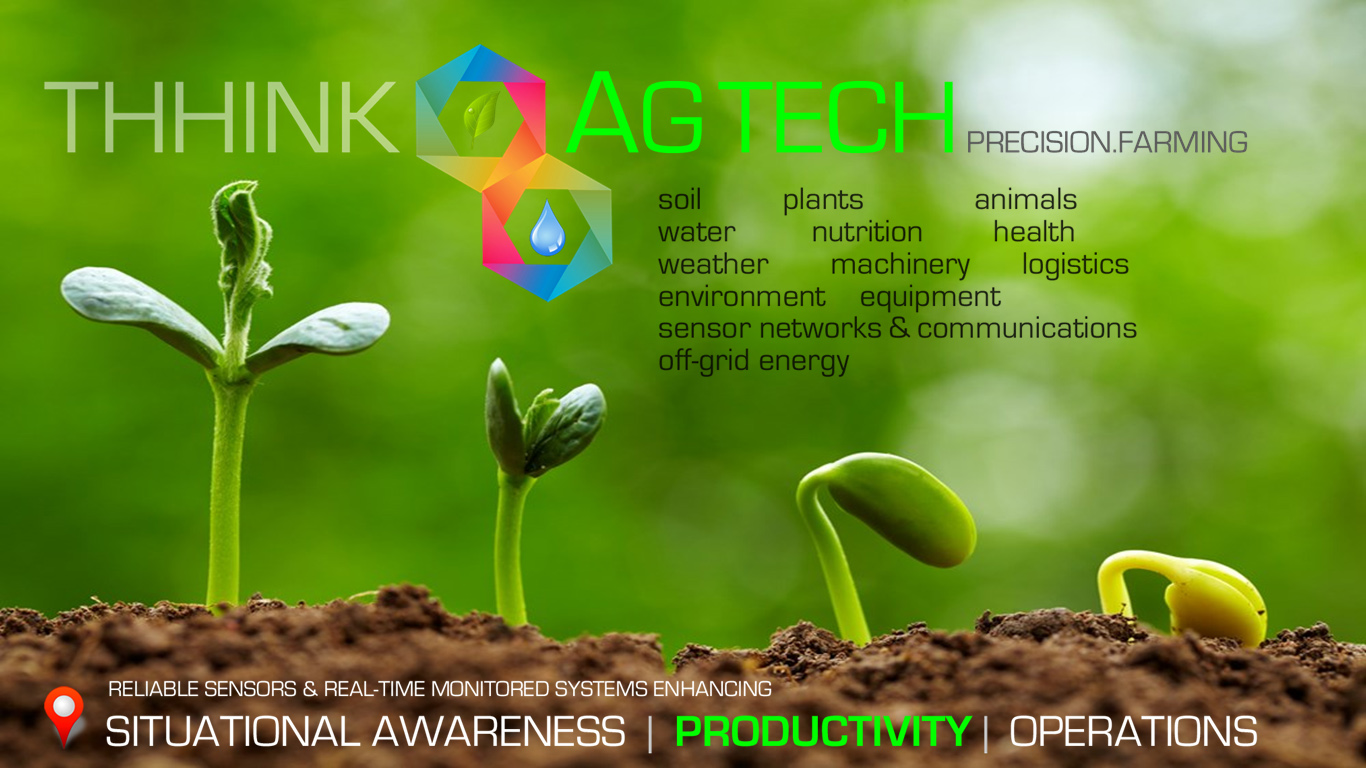
Smart agriculture is heavily exploiting advanced technologies such as Big Data, GPS, IoT and connected sensor devices to collect data from the field and analyse it so that the farmer can make accurate decisions in order to grow high quality crops. The field data is collected with the help of sensors, cameras, micro controllers, and actuators. Sensors and cameras can be used to provide information to the operator for water level, fertilizers as well as light required for growing the best quality food. The collected data is transferred via the Internet to the operator or the farmer for decision making. According to expert predictions, the Smart Agriculture market is expected to grow from USD 5.18 Billion in 2016 to USD 11.23 Billion by 2022, at a CAGR of 13.27% between 2017 and 2022 (Markets and Markets). The main share of this market is expected to come for hardware for sensors, network management, agriculture asset management, supervisory control and data acquisition, logistic and supply chain management. The whole concept of precision agriculture is based on accurate crop and soil observation, some of which are being achieved via automated NDVI image capture/processing for identifying crop and soil conditions using UAVs or drone technology. Farmers use these insights to maintain their crops and make better informed decisions that ultimately yield higher quality and greater quantity of crops. Smart water management can also be used to reduce human labour, minimize weather risks, and increase off-season production by saving water, reducing the use of chemicals and saving energy. Another key sector being revolutionised by smart technologies is indoor farming and horticulture. Increasing automation of commercial greenhouses and growing implementation of the Controlled Environment Agriculture (CEA) concept in greenhouses, is allowing a higher yield from maintenance of optimum growing conditions. Cultivators have shifted from conventional lighting systems to LED grow lights. Although LED grow lights are high in cost, they are an ideal option for indoor farming owing to their long-term benefits in terms of energy efficiency. In the smart agricultural sector, livestock monitoring is the fastest growing segment allowing monitoring of livestock performance, health and welfare using RFID, biometrics, and GPS to automatically obtain information on animals in real-time. Farm machinery is also becoming more automated and agricultural robots are being used to automate farming processes such as soil maintenance, weeding, fruit picking, harvesting, planting, ploughing, and irrigation. Here M2M communications, an integral part of IoT, allows coordination of multiple devices, appliances, and machines connected to the internet through multiple networks. 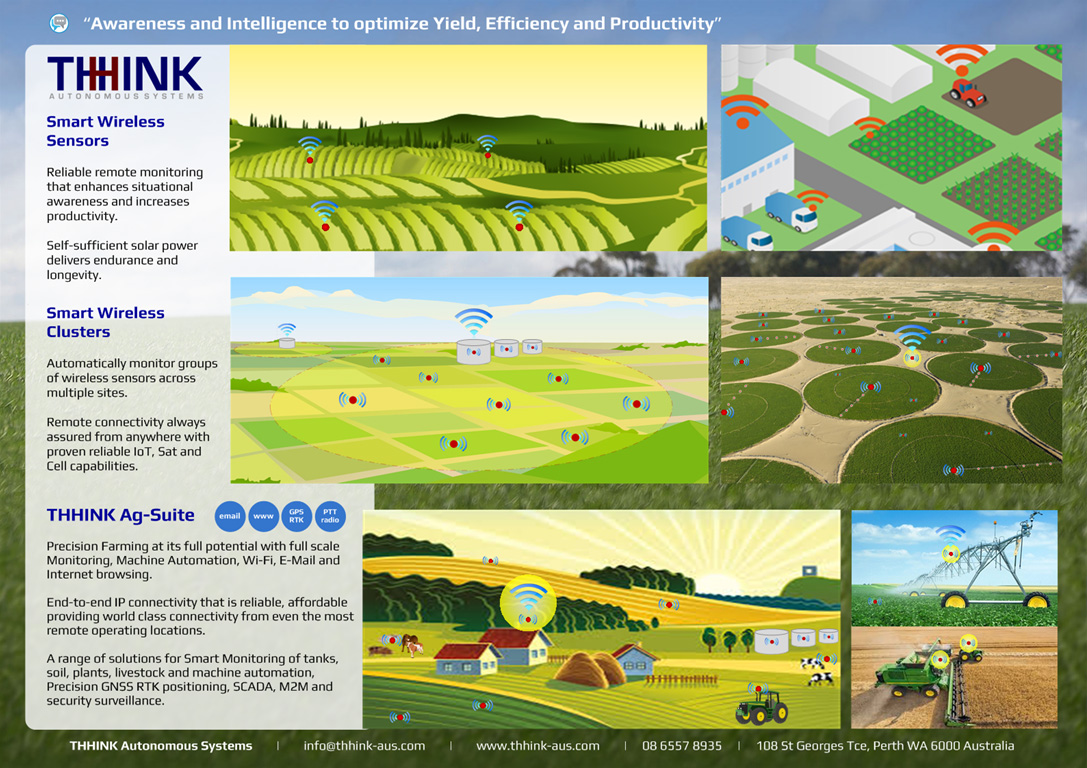
Key Projects IoF2020 [ www.iof2020.eu ] is supported by the European Commission with a budget of 30M Euros. The aim of IoF2020 is to build a lasting ecosystem that fosters the large-scale uptake of IoT technologies across a diverse sector considering farm-to-fork. 75 key stakeholders along the food value chain are involved in IoF2020 together with technology service providers, software companies and academic research institutions. Nineteen use-cases organised around five sectors (arable, dairy, fruits, meat and vegetables) will develop, test and demonstrate IoT technologies in operational farm environments all over Europe. Innovation Pipeline for Europe - THHINK White PaperTHHINK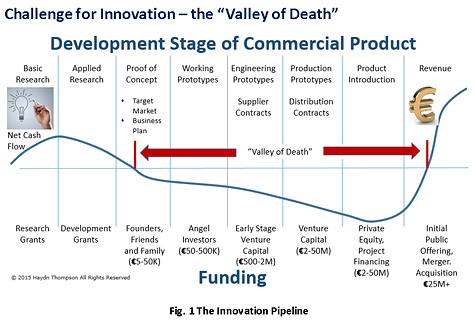 There is a need to provide support for innovation in both large industry and also SMEs which are the powerhouse of Europe. Innovation is led by industry pulling upon research that is performed both internally and also within academia. Currently, there is a "valley of death" problem between academic research at TRL 1-3 and industry which tends to develop from TRL 6 onwards. Even within industry, there is considerable "technology sensing and evaluation" going on but less activity in commercialising new ideas. An open innovation approach could well allow new ideas to be taken up and be exploited more fruitfully.
In this new White Paper by THHINK, we explain the need for strategic funding and actions to traverse the valley of death by creating an 'Innovation Pipeline' and its supporting ecosystem that will take new research outcomes and turn them into new products and processes.
There is a need to provide support for innovation in both large industry and also SMEs which are the powerhouse of Europe. Innovation is led by industry pulling upon research that is performed both internally and also within academia. Currently, there is a "valley of death" problem between academic research at TRL 1-3 and industry which tends to develop from TRL 6 onwards. Even within industry, there is considerable "technology sensing and evaluation" going on but less activity in commercialising new ideas. An open innovation approach could well allow new ideas to be taken up and be exploited more fruitfully.
In this new White Paper by THHINK, we explain the need for strategic funding and actions to traverse the valley of death by creating an 'Innovation Pipeline' and its supporting ecosystem that will take new research outcomes and turn them into new products and processes.
Important points we raise and discuss in this paper are: To find out more, you can download and read our full paper here: |
Tech Brief: Bbbb |
Tech Brief: Cccc |
Platforms4CPS (2016-2018)
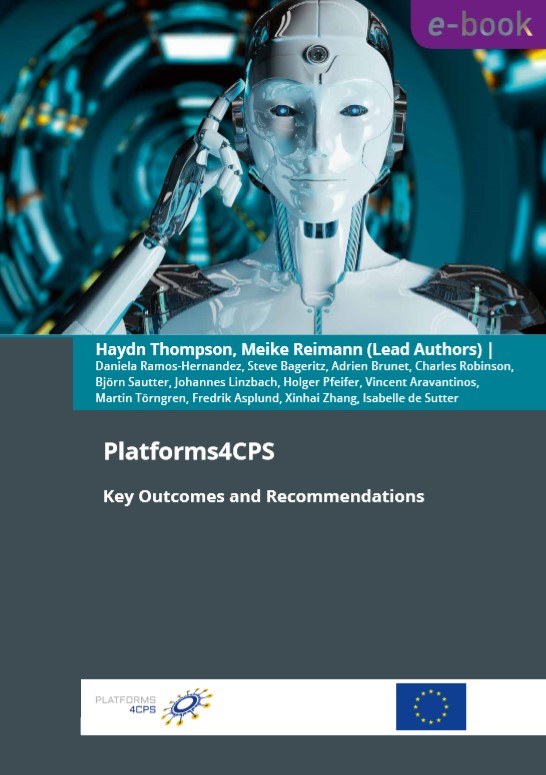
This report presents key European industrial markets and the results of bringing together a number of European Roadmaps.
The Final Report on Societal and Legal Issues is here:
PICASSO (2016-2018)
ICT plays a crucial role in responding to the related economic and social challenges. These challenges are common for the EU and the US and affect citizens around the world. Global solutions are thus required. THHINK acted as the strategic link to NIST and led Work Package 1 establishing EU-US Industrial drivers, societal needs and the ICT collaboration landscape. For this the company produced a panorama of EU-US ICT policies and regulations, programs, priorities, networks, projects and access opportunities in smart cities, smart transport and smart energy, Big Data, 5G and IoT/CPS. THHINK also interviewed industry identifying the industrial drivers, societal needs, the barriers to exploitation, the business models being considered and the necessary regulation or standardisation required for successful exploitation. This also considered cross-domain relationships/application areas/opportunities for EU-US collaboration in non-competitive and pre-competitive areas. THHINK was also an Expert on the transnational CPS/IoT Expert Group that was set up by the project.
PICASSO Project LaunchFebruary 2016
First PICASSO Expert Group Meeting was hosted by NIST at the Department of Commerce in Washington DCMay 20, 2016
THHINK organised the First PICASSO Expert Group Meeting which was hosted by NIST at the Department of Commerce in Washington DC on May 20, 2016. In total 66 people registered for the event including Expert Group members and invited key actors, i.e. from NIST, NSF, NITRD, IMS, as well as PICASSO project partners. During the individual Expert Group morning sessions, key challenges and needs for each domain: 5G, Big Data, IoT and CPS were defined, aiming at revealing gaps and strategic opportunities for EU-US collaboration. The EU-US ICT Policy Expert Group focused on the horizontal overarching policy issue of Privacy and Data Protection, relevant for EU-US collaboration in these domains. The findings were shared and discussed with the entire audience in a joint public session.
The aim of the Panorama document was to set the scene for the PICASSO project and act as input to the Expert Groups for discussions. Another aim of the document was to identify gaps and opportunities, the key challenges in the selected domains and open problems, and the needs for supporting policy measures and strategic EU-US initiatives (both policy and research related). It was highlighted that large ICT research and innovation efforts exist in both the EU and the US in these areas and they are also priority topics in various funding programmes in the EU and the US. As a consequence networks and critical mass in these subjects is present on both sides of the Atlantic which affords the opportunity for collaboration. It was noted that there are commercial benefits for companies to sell to the EU and US and vice versa but the world-wide market is far larger and is a compelling reason for collaboration. Road4FAME (2013-2015)
In addition to working on the roadmap, THHINK led work on identifying new Business Opportunities for manufacturers and service providers and performed work on Business Modelling identifying 100 business models. Road4FAME project identifies 4 Priority Research Areas for ManufacturingA report advising the European Commission on priorities for research to help boost manufacturing productivity and competitiveness identified real-time data acquisition and analysis as one of several areas in need of urgent attention. The Orientation Paper, released by the Road4FAME project, found that research into this and other issues could reduce costs and help small and medium-size enterprises (SMEs) become more competitive and innovative.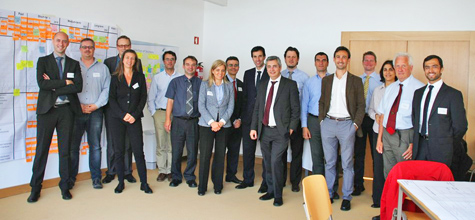
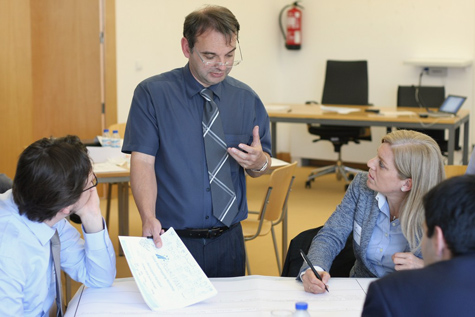
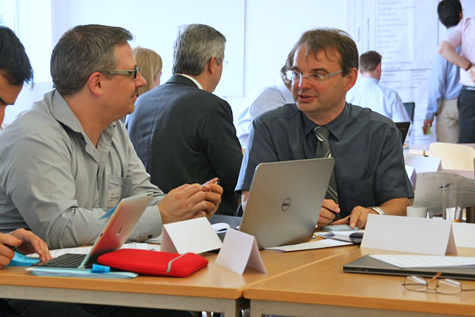
EU FP7 Road4FAME Handbook:"Strategic Research & Innovation Roadmap and Business Opportunities for ICT in Manufacturing"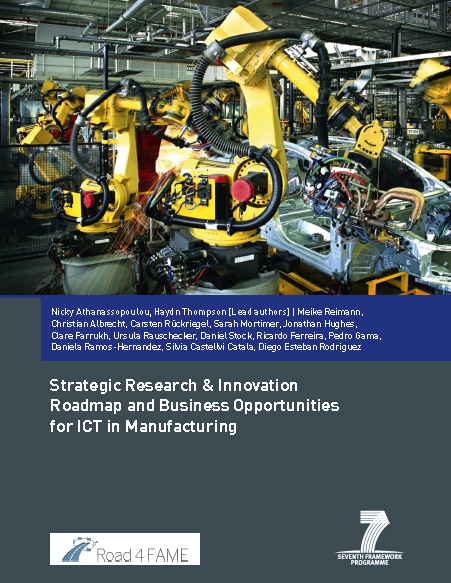
Authors:
|
Technology RadarIn related work at THHINK BV a Technology Radar has been created to help SMEs and midcaps. Below is clickable version of the radar. If you have comments or suggested technology additions to the radar please contact THHINKBV here. Readiness is classified in terms of: "Red: Long Term - Hold off for now" to represent technologies that are not yet proven and not worth investing in yet "Amber: Medium Term - Assess" a technology that is promising and worth exploring with the goal of understanding how it may have an impact "Green: Short Term - Adopt" for a technology that industry should be adopting. |
Consultant to the European Commission
THHINK is a consultant to DG Connect and DG GROW evaluating and monitoring Public Private Partnerships and Large Scale Pilots, and writing a number of EC documents on Internet of Things, Artificial Intelligence, Cyber Physical Systems, Systems of Systems, Electronics and Digital Manufacturing, covering technology roadmaps, policy and strategy for ICT. The company also provides Expert input into the EC’s AI Unit and into areas such as Wearables and Photonics. Additionally, the company reviews projects for the EC across many domains including automotive, aerospace, manufacturing, robotics and agriculture. THHINK also acts as Rapporteur for the DEI Working Groups, key EU Events such as the DEI Stakeholder Forum and the EC’s Electronics Leaders Group defining strategy and budgets for Horizon Europe and Digital Europe. The company also provides support to the European Parliament with briefing papers/videos for MEPs on the societal and legal issues of future autonomous transportation systems and has engaged with the European Investment Bank considering new funding approaches. In 2017 THHINK was commissioned by the EC to write a report on Standardisation with recommendations for establishing a Multi-Stakeholder Platfrom/DEI Working Group on Standardisation which was set up in 2018. In 2019 THHINK was commissioned by the EC to become the Facilitator for Harmonisation of Standardisation across Europe interacting with SDOs, other informal standards organisations, H2020 projects, government initiatives and industry (including SMEs) to create a Standardisation Stakeholder Engagement Platform. Stakeholders include DIN, IEC, Trilateral Initiative, IBM, Fraunhofer, Alstom, Plattform Industrie 4.0, Industrie 4.0 Standardisation Council, Smart Industry (Netherlands), Vanguard, VDMA, BOOST 4.0, EFFRA, ETSI, AIOTI, CREATE-IoT, ECSEL, BDVA, Productive 4.0, euRobotics, EPoSS and other H2020 projects. Publications for the European CommissionH.A. Thompson, “Validation Report on Standardisation Harmonisation”, EC Report, September 2019.H.A. Thompson, "AI in Manufacturing", Report from the Workshop on in Manufacturing, July 2019. H.A. Thompson, “Boosting Electronics Value Chains”, EC Electronics Leaders Working Group, June 2018. H.A. Thompson, “DEI Stakeholder Forum 2018”, Report from the DEI Stakeholder Forum, April 2018 H.A. Thompson, "Standardisation to Support Digitisation", Report from the Workshop on Standardisation to Support Digitising European Industry", October 2017. H.A. Thompson, "Digital Manufacturing Platforms for Connected Smart Factories", Report from the Workshop on Digital Manufacturing Platforms for Connected Smart Factories" October 2017. H.A. Thompson "Smart Cyber-Physical Systems Concertation Event", Report from the Smart Cyber Physical Systems Concertation Event, January 2017. Roel van den Berg and Haydn Thompson, "Digitising European Industry initiative - Working Group 2: Strengthening Leadership in Digital Technologies and in Digital Industrial Platforms across Value Chains in all Sectors of the Economy", December 2016. H.A. Thompson, "The Smart Cyber-Physical Systems cluster of EU projects", Report from the ARTEMIS and Horizon2020 Clustering and Communication Event, May 2016. H.A. Thompson and C. Enzing (Technopolis Group, The Netherlands), "CPS for Logistics and transport: Short and long term trends and their societal and ethical impacts", Briefing Paper for European Parliament, January 2016. H.A. Thompson "Innovation in Digital Manufacturing", Report from the EC Workshop on Innovation in Digital Manufacturing, Brussels, Belgium. January 2015 H.A. Thompson, "Internet of Things - A Deeper Dive", Report from the EC Workshop on Internet of Things - A Deeper Dive, Brussels, Belgium, December 2014. H.A. Thompson, "Cyber-Physical Systems: Uplifting Europe's Innovation Capacity", Report from the EC Workshop in Brussels, Belgium, October 2013 H.A. Thompson, "Systems of Systems Engineering and Control", Report from the EC Workshop on Systems and Systems Engineering and Control Brussels, Belgium, October 2013. H.A. Thompson, "Directions in Systems of Systems Engineering", Report from the EC Workshop on Synergies among Projects and Directions in Advanced Systems Engineering", Brussels, Belgium, July 2012. |
Satellite Communications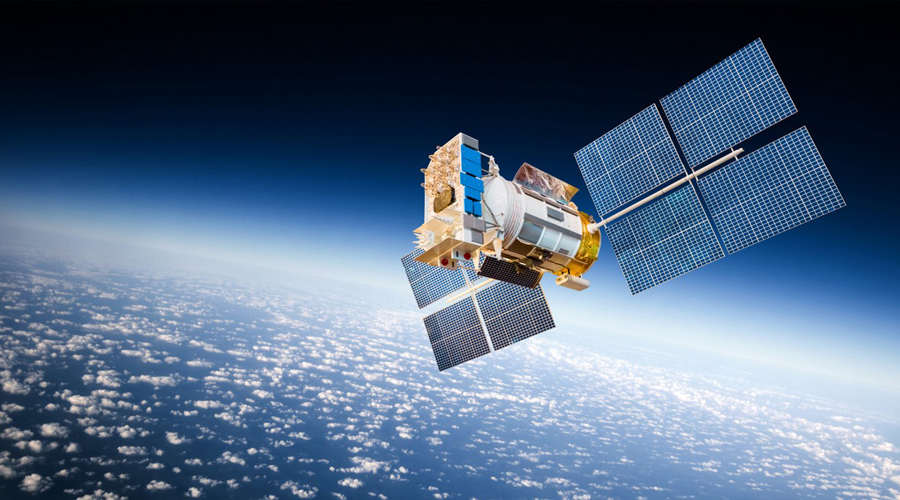
THHINK prides itself on being able to get data from anywhere to anywhere on the globe providing Smart Anything Everywhere (Anytime). In order to do this the company is active in LP-WAN and wireless cellular connectivity for urban and regional sites. To provide world-wide coverage and a “one-stop shop” for customers the company provides satellite data packages for leading networks. This includes Iridium which operates the world’s only truly global satellite communications network with a constellation of 66 crosslinked Low Earth Orbit (LEO) satellites, Inmarsat who provide global, mobile satellite communications global voice, broadband and IoT services and Globalstar, who operate 24 LEO satellites for satellite phone and low-speed data communications THHINK Cloud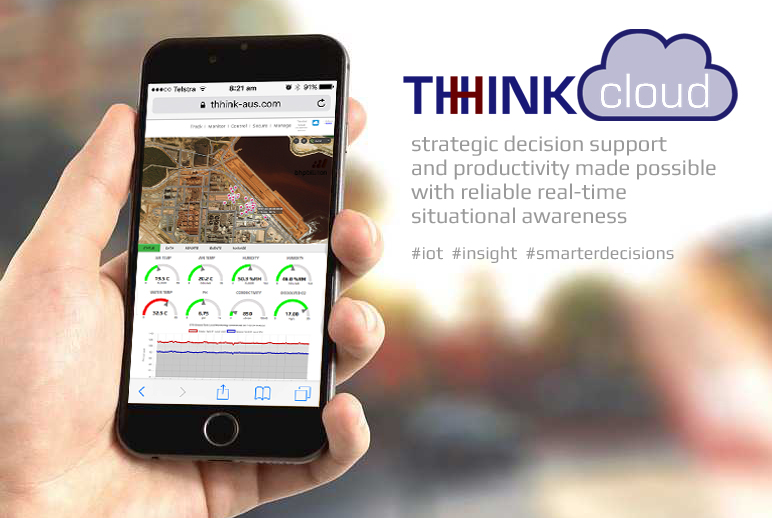
THHINK smart sensor systems can provide fully automated wireless telemetry for data acquisition, data storage and reporting. THHINK-Cloud is a graphical Online Dashboard facility that delivers data, charts and interactive maps for convenient viewing online anytime, anywhere. 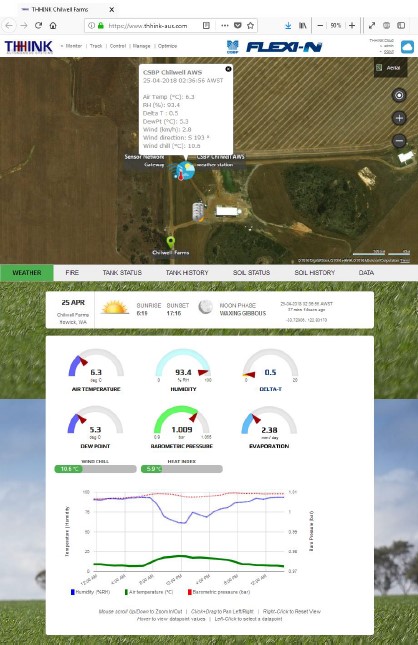
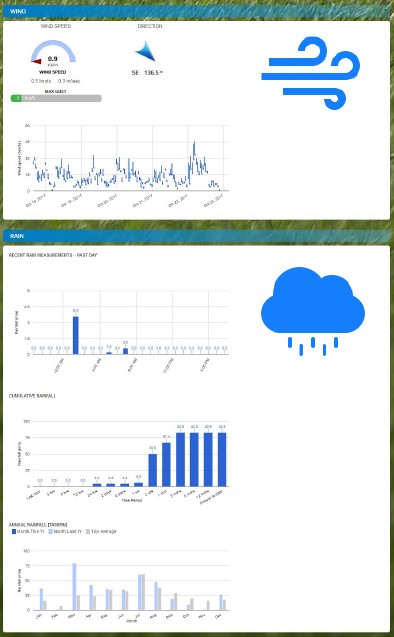
THHINK can also provide data analytics to better understand data and provide insights for optimisation and planning. Here the company has a wealth of expertise in AI technologies for data analysis and mining. |
The THHINK Group
THHINK was founded as a company in the UK in 2009 and has grown through the years to a group of 4 companies located around the world. THHINK Wireless Technologies Ltd. in the UK has been operating for over 10 years and concentrates on applications engineering, "THHINK and Do", and prides itself on its ability to provide innovative practical solutions to challenging problems. It was clear that for some of these solutions new leading edge technologies needed to be developed. As a result of this, in 2011 THHINK Wireless Technologies Ltd. (Japan) was formed to develop micro-generator technology to power future M2M and IoT applications. THHINK (Japan) thus concentrates on developing future technologies, "THHINK Ahead", providing novel technologies and expertise to the group. Over the years THHINK found that increasingly it was asked to provide consultancy services to other companies and engage in joint partnerships across Europe. Amsterdam is a centre for IoT applications in Europe and the Netherlands is a leader in the adoption of Smart Agriculture. Thus, in 2016 THHINK BV was founded in the Netherlands to provide research and development and consultancy services in the IoT sector "THHINK IT Through" and promote the company's activities in the agricultural domain. THHINK has also continued to innovate in the autonomous vehicles sector through research programmes and strategic links with Universities, such as Cranfield University in the UK and KTH in Sweden. As a result of these interests and a wealth of identified opportunities in Australia, THHINK Autonomous Systems Pty. "THHINK for Itself", was founded in Australia in 2016 to develop and operate autonomous surface, underwater and flying vehicles. All the companies operate as separate business entities, but collectively they work together providing expertise, research & development and consulting across the group. THHINK Autonomous Systems Australia
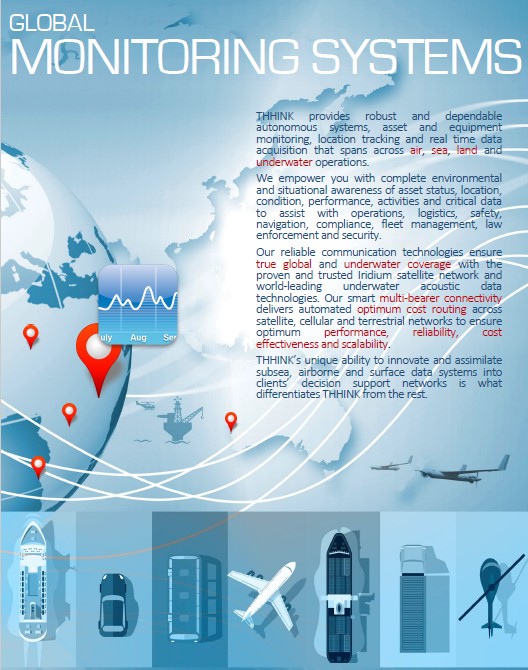
THHINK Autonomous Systems www.thhink-aus.com provides integrated sensor data systems complete with real-time wireless connectivity and continuous monitoring capabilities for any fixed position equipment as well as mobile autonomous platforms and unmanned vehicles such as Boeing Wave Glider ASV, Kongsberg Seaglider AUV and various airborne UAS platforms. With a wide range of core engineering capabilities in embedded electronic control and processing systems, wireless connectivity, energy endurance, GIS location and enterprise online services, THHINK develops new products and services from initial conception through to field deployment and remote operations. All THHINK systems are designed, tested and manufactured with one goal in mind: Reliable performance in challenging environments and mission endurance to deliver dependable monitoring over extended periods of time. THHINK develops, deploys and operates a variety of interconnected smart sensor devices that include Internet-of-Things (IoT) enabled devices, Low-Power RF (LPRF), cellular GSM 3G telemetry and satellite M2M systems to exact client specification. THHINK is an authorised provider and integrator of Iridium and Globalstar satcomms data services that can fully support operations in remote and regional areas that others find difficult to access. 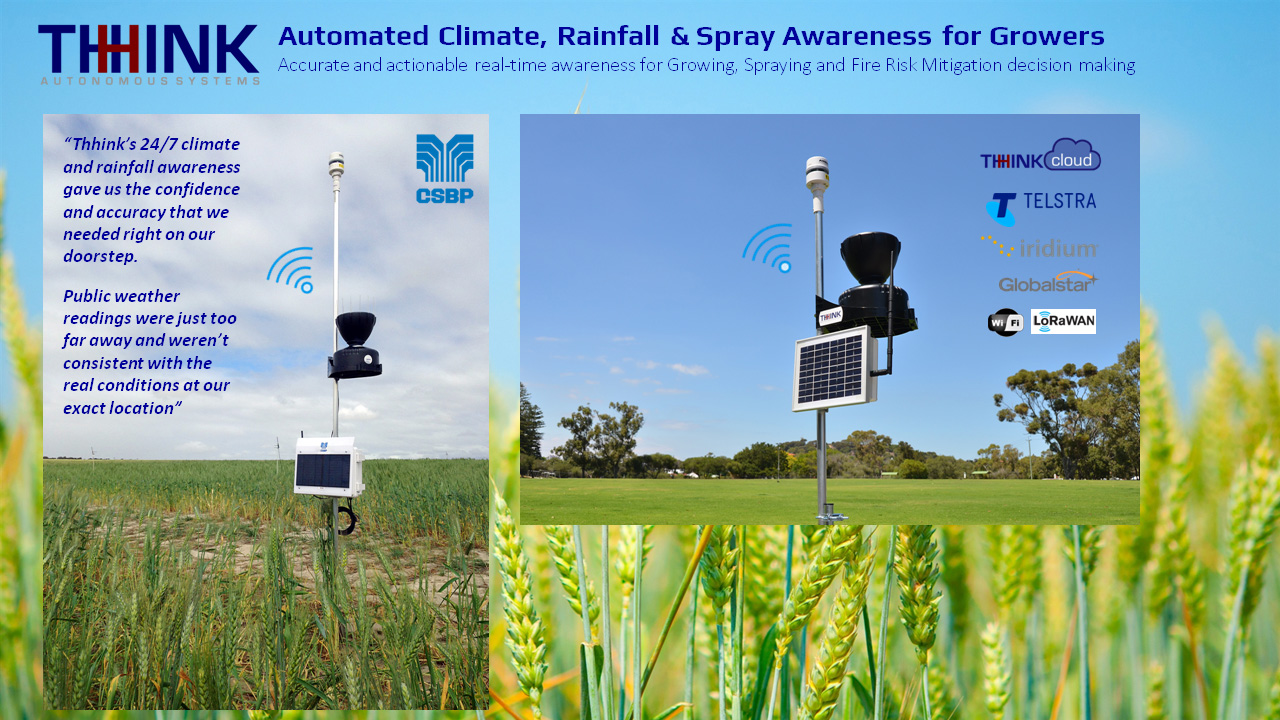
This capability and experience enables THHINK to architect and deliver reliable cost-effective performance from anywhere in the world across any land, sea or air application. THHINK’s unique Multi-Carrier technologies with Lowest Cost Routing enable sensors to transition seamlessly and scavenge across various networks whilst delivering seamless situational awareness. Ultimately, our customers benefit from seamless and reliable remote sensing awareness whether operating in urban, regional or very remote environments. 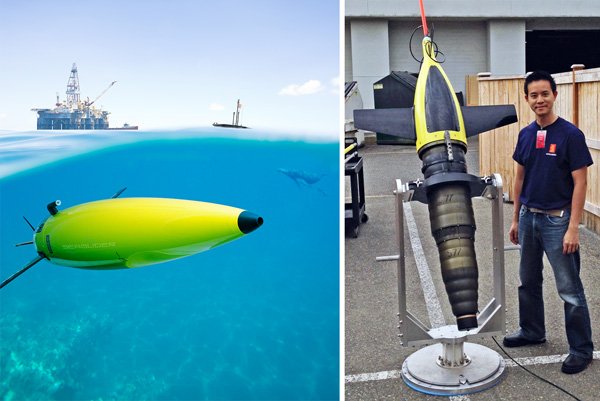
THHINK’s Offshore and Underwater series of networked products enable several underwater sensor instruments to sense, communicate and report critical data in near real-time from anywhere underwater whether surface, mid-water or from down at seafloor depths of 3000m. The THHINK Cloud ecosystem is fully automated to provide seamless and persistent presence whether monitoring the seabed, ocean, air or land environments. THHINK’s innovative monitoring technologies demonstrate next-gen IoT innovation in action today and everyday, 24-7-365, delivering situational awareness directly to desktop and mobile devices. THHINK BV
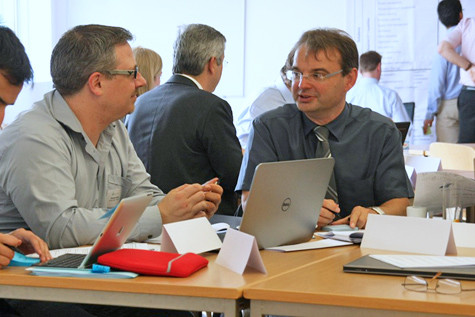
THHINK BV www.thhink-aus.com performs high tech consultancy, research and development in ICT technologies for the aerospace, automotive, marine, rail transport, energy and health sectors. The company provides consultancy and innovative solutions to leading companies and institutions across Europe. 
THHINK BV is very active in helping SMEs and mid-caps to digitise through the Smart4Europe 1 and Smart4Europe 2 Coordination and Support Actions, which are co-financed by the European Commission, under the Smart Anything Everywhere Initiative. These projects have successfully brought together a critical mass of Innovation Actions (IAs) with a long track record of promoting the digital transformation of European Industry in the areas of Smart Systems Integration, Organic and Large Area Electronics, Internet of Things, Advanced Computing and Cyber Physical Systems. Key activities of THHINK BV have been the development and maintenance of a Technology Radar, and identification of Research, Business Angel and Private Venture funding sources across Europe. THHINK Wireless Technologies Japan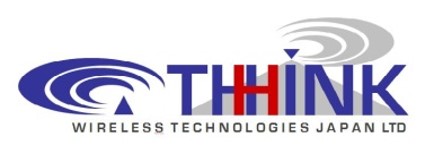
THHINK Wireless Technologies Japan was founded in 2012. THHINK Japan www.thhink-jp.co.jp performs research and development into advanced micro-generator technologies for the company. This technology is seen as the key to providing widescale deployment of vibration harvesting with small, lightweight packages that can be used in a multitude of mass market applications, e.g. vehicle monitoring, health and wellbeing, etc. In 2012, the company established a Research Lab in Tokyo University to develop micro-generator powered wireless sensors. 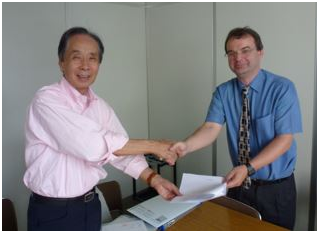
Yutaka Hattori and Haydn Thompson, Managing Directors of THHINK Japan and THHINK UK THHINK at Techno Frontier 2013
Demonstrations of Vibration Microgenerators in Action: 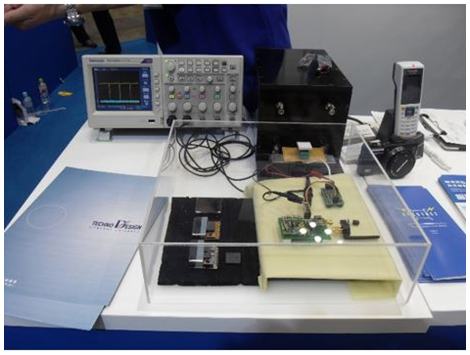
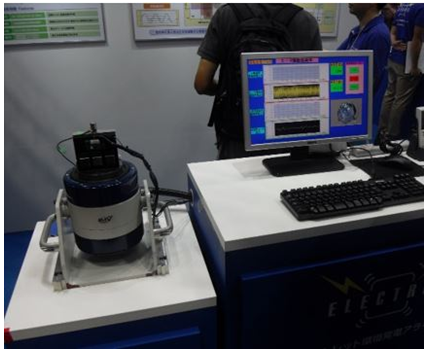
THHINK at the 2nd and 3rd UK-Japan Workshops on Energy HarvestingTHHINK is active promoting energy harvesting applications to industry. Both THHINK UK and THHINK Japan were represented at the 2nd UK-Japan Workshop on Energy Harvesting with Haydn Thompson chairing the afternoon of the event. This event covered a range of energy harvesting approaches solar, thermal, vibration, chemical and RF with a range of very interesting and diverse applications. THHINK UK and THHINK Japan also attended the 3rd UK-Japan Energy Harvesting Workshop which was held as part of the PowerMEMS Conference in London in December 2013.THHINK at TechnoFrontier 2015In 2015 THHINK Japan exhibited innovative Energy Harvesting technologies at TechnoFrontier 2015 in Tokyo, Japan. Yutaka Hattori and Yasu Hatano from THHINK Japan attended the event and a new wearable micro-generator was demonstrated that harvests energy from human motion which can be used for various wearable technologies and smart monitoring applications.
Rotational Electret Generator Launched at CEATEC 2015Haydn Thompson of THHINK UK and Yutaka Hattori of THHINK Japan attended CEATEC 2015 in Tokyo, Japan where THHINK launched a new electret rotational generator with Hokuriku Electric Industry Co. This new generator is targeted at wearable technologies and Internet of Things (IoT) applications. At a very busy event (please see BBC Click's 2 part special on the event) the generator "generated" considerable interest. In addition to demonstrations of the generator in action, the concept was also shown embedded within a smart phone to harvest human motion and enhance the battery life of devices.
Paper on Rotational Generator Wins Best Paper Award at PowerMEMS 2015A paper by J. Nakano, K. Komori, Y. Hattori and Y. Suzuki entitled "MEMS Rotational Electret Energy Harvester for Human Motion" won best paper at the PowerMEMS 2015 event in Boston. The award winning paper reports on the development of MEMS rotational electret energy harvester (EH) for capturing kinetic energy of human motion using an optimal design method considering the rate of overlapping-area-change and the parasitic capacitance.
|
CONTACT USTHHINK Wireless Technologies Ltd. 11 Venture One Business Park Sheffield S20 3FR United Kingdom E-mail: info [at] thhink.com Phone: +44 114 2215400 THHINK Autonomous Systems Pty. AUSTRALIA Level 25, 108 St Georges Terrace, Perth WA, 6000, Australia. www.thhink-aus.com THHINK BV. NETHERLANDS Schiphol Boulevard 127, 1118BG, Schiphol, Netherlands. www.thhinkbv.com THHINK Wireless Technologies Ltd. JAPAN 5-27-5 Inamuragasaki, Kamakura, Kanagawa, Japan. www.thhink-jp.co.jp |

|
THHINK Sensors and DataloggersExpertise
Through many years of R&D experience with leading companies, THHINK has developed exceptional expertise in the field of advanced sensing, remote condition monitoring, wireless data acquisition and telemetry information systems. Our innovative solutions include self-powered energy harvesting technologies as well as optimal battery and power management systems that enable efficient and dependable operation. We are able to provide core energy harvesting systems, wireless sensor solutions as well as complete remote monitoring systems. Different applications will require different innovative solutions depending on sampling requirements, data throughout and the wireless radio environment in which the system components are required to operate. The availability of various energy sources - whether thermal (heat), vibration, solar, RF-powered or rechargeable battery - are factors considered in the design for optimal self-powered operation. A whole range of wireless solutions - from ultra-low powered networks to embedded WLAN and cellular GSM/GPRS/3G - are leveraged to reliably monitor your assets, equipment and operating environments. THHINK prides itself on its applications expertise that allows our company to design and deliver the right solution to suit your specific monitoring problem. We can provide consultancy to solve your problem or we can provide a full turnkey working solution. Our technology solutions are built up from proven capability in various demanding applications and we have a number of in-house technologies available in terms of micro-thermal energy harvesters, micro-vibration energy generators, solar harvesters and specialist-designed high-efficiency power management circuitry. A key goal of the company is to provide "the right data to the right person at the right place and right time". THHINK Sensors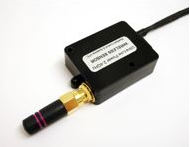
The company provides a range of innovative sensing solutions that optimises 'SWaP' requirements for Size, Weight and Power. Sensor and sensor network solutions are available to cover a range of parameters such as:
THHINK Dataloggers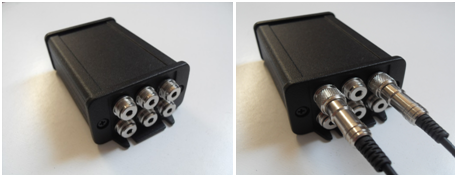
THHINK can provide a range of ultra low power datalogging solutions that can be tailored to your needs. We provide rugged solutions with typically a 2mW average power consumption. This means that the units can operate for very long periods on battery technology and also can be powered by energy harvesting solutions. 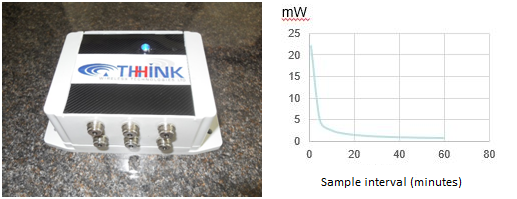
We provide up to 6 channels of 12-bit logging capability in our standard units with a range of digital interfaces including CAN. Data is stored on SD or MicroSD card technologies so memory capacity can be easily expanded. Higher bit-depth and increased channel count can be made available upon request. We are happy to provide tailored versions of our units for customers. 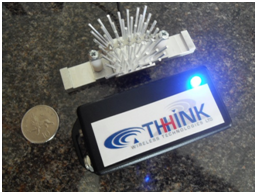
The THHINK single channel logger can be used to record a range of data inputs from temperature to vibration and again has very low power consumption making energy harvesting operation possible. Precision Agricultural Monitoring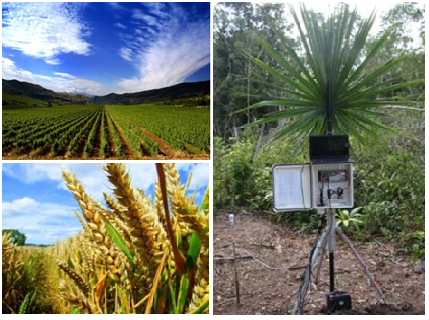
Environmental monitoring is being used to great effect in agriculture to improve yield and to intelligently monitor and control the consumption of scarce resources in irrigation systems. Increased pollution is also driving the need for monitoring in cities. THHINK's solar powered environmental monitoring systems provide a cost effective and low maintenance solution that can be widely used. THHINK are working with the UNAM Mexico and NASA to provide environmental monitoring systems in a number of sites in Mexico. 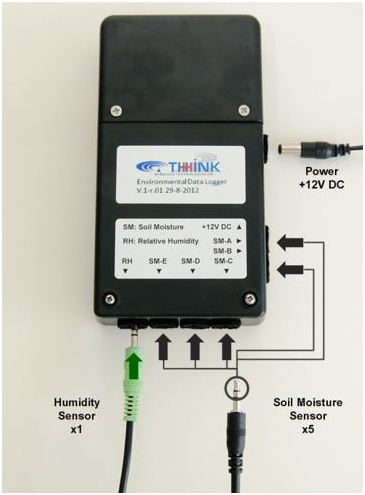
These systems have been designed for agricultural and scientific monitoring of temperature, relative humidity and soil moisture. These dataloggers typically consume less than 0.5mW of power allowing them to be powered by very small solar panels. Wireless InterfacesA multitude of monitoring applications require gathering of additional data on the health of key components within the system. Typically, information on temperatures (indicating impending failure from frictional wear), vibration indicating failure of bearings or imbalance and pressure (indicating blockage, leakage or significant loss of coolant/oil) are monitored. In many cases the addition of sensors to monitor these parameters is difficult due to the installation costs and time to wire up the monitoring system. The use of wireless sensors thus allows very fast and low cost installation of monitoring to new systems and retrofit of monitoring to existing systems. Sophisticated networks of sensors can be installed very quickly without the need for extensive wiring.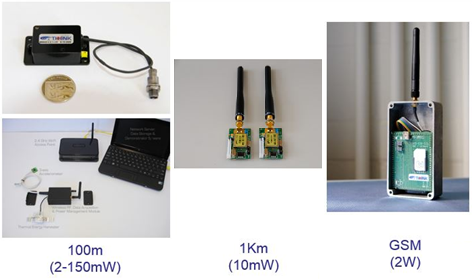
The company can provide a range of wireless interfaces dependent upon application. For short range communications (up to 100m) THHINK can provide ultra low power RF technologies working at 2.4GHz, 900MHz and 433MHz and low power embedded Wi-Fi and Bluetooth interfaces. For longer range communication the company can provide links that allow communication over a kilometre and for integration into existing Mobile Phone networks the company provides GSM interfaces allowing you to remotely access your data wherever you are. THHINK Wireless Sensors and Energy HarvestingTHHINK are at the forefront of energy harvesting technologies providing solar, thermal and vibration harvesting technologies. Below are some examples that showcase a few applications that harvest energy from commonly available energy sources in our surrounding environment.THHINK Self-Powered Wireless SensorsDemonstration of vibration powered wireless sensor, input vibration frequency 30Hz. Coffee Mug PowerTHHINK wireless sensor exclusively powered by waste heat from a regular coffee mug. Each blink of its LED indicates transmission of a wireless message by the ultra-low power sensor (2.4GHz). Wireless Sensors powered by Motor VibrationTHHINK wireless sensor harvesting motor vibration (50 or 60Hz). Wireless Sensors powered at Railway Track by passing TrainsTHHINK wireless sensor harvesting train vibration for bridge monitoring. Energy Harvesting from Human Motion to power Body Networks and DevicesTHHINK wireless sensor harvesting human motion. Other Monitoring ApplicationsTHHINK have produced a multitude of solutions for customers. For further information look at the activities of the THHINK Group or contact us for further information on our monitoring solutions and the THHINK Cloud. E-mail: info [at] thhink.com |
2020 © THHINK. All rights reserved.